Entrepreneurship and Small Business Management
VerifiedAdded on 2023/01/10
|19
|6368
|49
AI Summary
This document discusses the different types of entrepreneurial ventures and their relation with typology of entrepreneurship. It explores the similarities and differences between entrepreneurial ventures and assesses the impact of small and micro businesses on the local economy. It also examines the characteristics and skills of successful entrepreneurs and how background and experience can foster or hinder entrepreneurship.
Contribute Materials
Your contribution can guide someone’s learning journey. Share your
documents today.

Unit-9- Entrepreneurship and
Small Business Management
Small Business Management
Secure Best Marks with AI Grader
Need help grading? Try our AI Grader for instant feedback on your assignments.
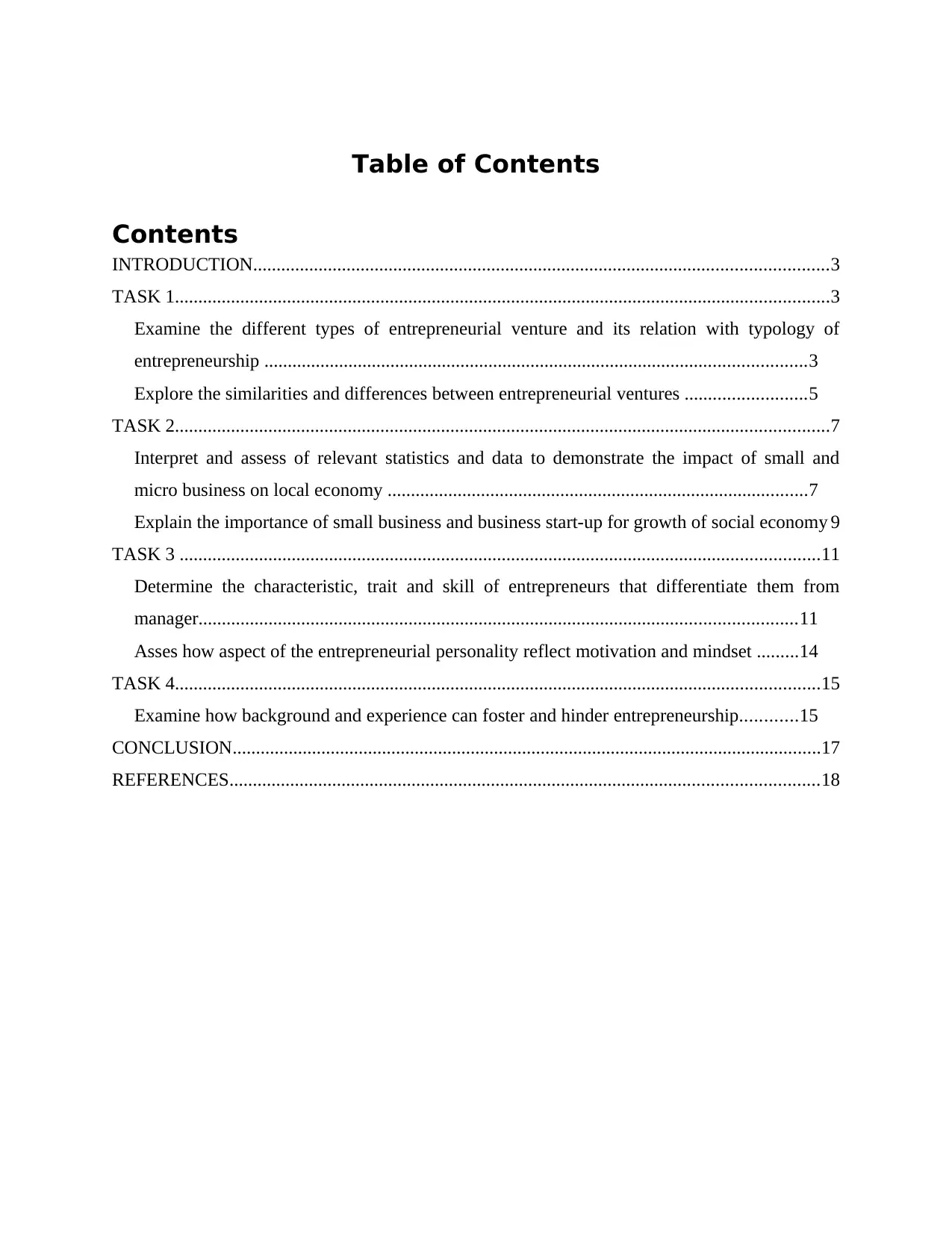
Table of Contents
Contents
INTRODUCTION...........................................................................................................................3
TASK 1............................................................................................................................................3
Examine the different types of entrepreneurial venture and its relation with typology of
entrepreneurship ....................................................................................................................3
Explore the similarities and differences between entrepreneurial ventures ..........................5
TASK 2............................................................................................................................................7
Interpret and assess of relevant statistics and data to demonstrate the impact of small and
micro business on local economy ..........................................................................................7
Explain the importance of small business and business start-up for growth of social economy 9
TASK 3 .........................................................................................................................................11
Determine the characteristic, trait and skill of entrepreneurs that differentiate them from
manager................................................................................................................................11
Asses how aspect of the entrepreneurial personality reflect motivation and mindset .........14
TASK 4..........................................................................................................................................15
Examine how background and experience can foster and hinder entrepreneurship............15
CONCLUSION..............................................................................................................................17
REFERENCES..............................................................................................................................18
Contents
INTRODUCTION...........................................................................................................................3
TASK 1............................................................................................................................................3
Examine the different types of entrepreneurial venture and its relation with typology of
entrepreneurship ....................................................................................................................3
Explore the similarities and differences between entrepreneurial ventures ..........................5
TASK 2............................................................................................................................................7
Interpret and assess of relevant statistics and data to demonstrate the impact of small and
micro business on local economy ..........................................................................................7
Explain the importance of small business and business start-up for growth of social economy 9
TASK 3 .........................................................................................................................................11
Determine the characteristic, trait and skill of entrepreneurs that differentiate them from
manager................................................................................................................................11
Asses how aspect of the entrepreneurial personality reflect motivation and mindset .........14
TASK 4..........................................................................................................................................15
Examine how background and experience can foster and hinder entrepreneurship............15
CONCLUSION..............................................................................................................................17
REFERENCES..............................................................................................................................18
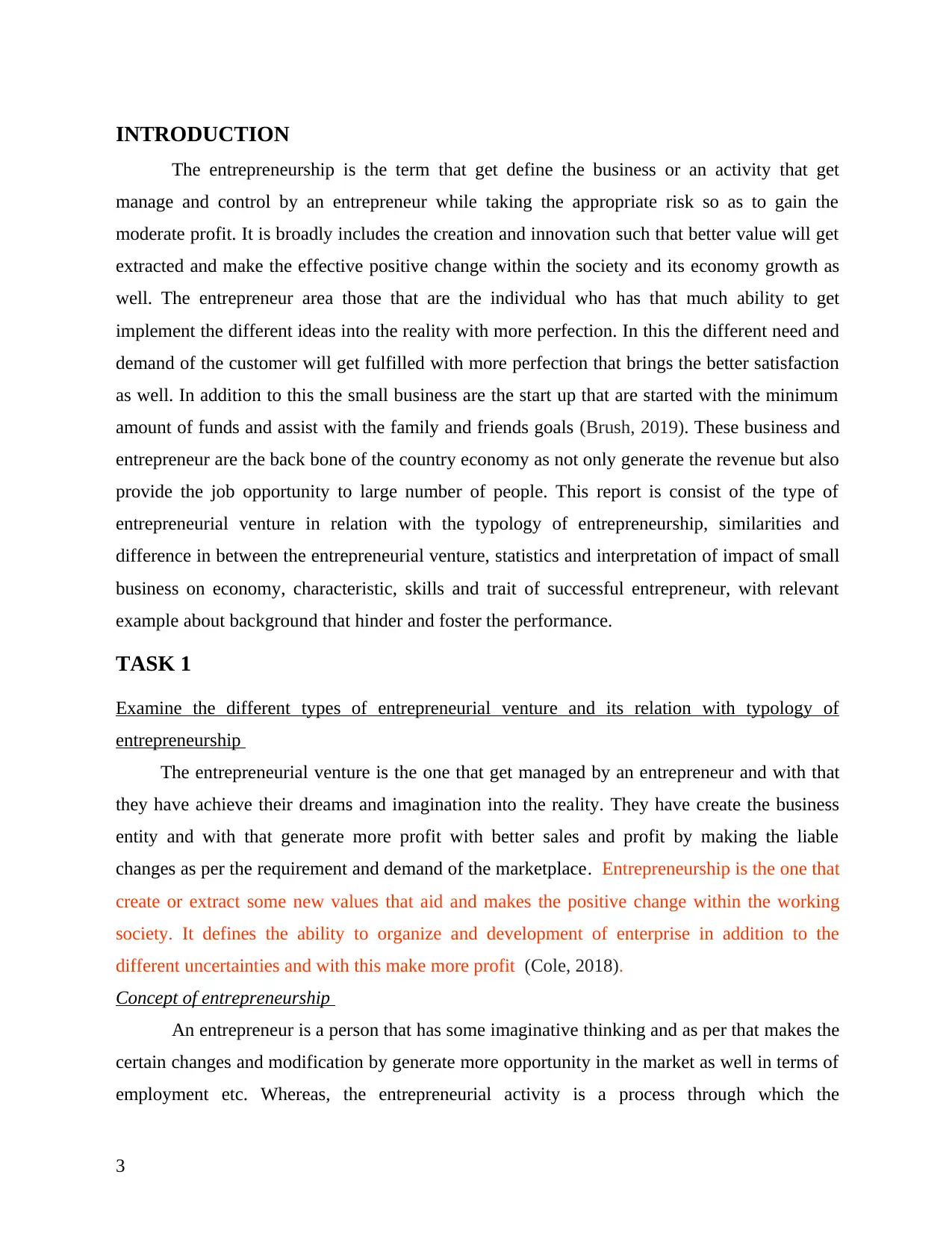
INTRODUCTION
The entrepreneurship is the term that get define the business or an activity that get
manage and control by an entrepreneur while taking the appropriate risk so as to gain the
moderate profit. It is broadly includes the creation and innovation such that better value will get
extracted and make the effective positive change within the society and its economy growth as
well. The entrepreneur area those that are the individual who has that much ability to get
implement the different ideas into the reality with more perfection. In this the different need and
demand of the customer will get fulfilled with more perfection that brings the better satisfaction
as well. In addition to this the small business are the start up that are started with the minimum
amount of funds and assist with the family and friends goals (Brush, 2019). These business and
entrepreneur are the back bone of the country economy as not only generate the revenue but also
provide the job opportunity to large number of people. This report is consist of the type of
entrepreneurial venture in relation with the typology of entrepreneurship, similarities and
difference in between the entrepreneurial venture, statistics and interpretation of impact of small
business on economy, characteristic, skills and trait of successful entrepreneur, with relevant
example about background that hinder and foster the performance.
TASK 1
Examine the different types of entrepreneurial venture and its relation with typology of
entrepreneurship
The entrepreneurial venture is the one that get managed by an entrepreneur and with that
they have achieve their dreams and imagination into the reality. They have create the business
entity and with that generate more profit with better sales and profit by making the liable
changes as per the requirement and demand of the marketplace. Entrepreneurship is the one that
create or extract some new values that aid and makes the positive change within the working
society. It defines the ability to organize and development of enterprise in addition to the
different uncertainties and with this make more profit (Cole, 2018).
Concept of entrepreneurship
An entrepreneur is a person that has some imaginative thinking and as per that makes the
certain changes and modification by generate more opportunity in the market as well in terms of
employment etc. Whereas, the entrepreneurial activity is a process through which the
3
The entrepreneurship is the term that get define the business or an activity that get
manage and control by an entrepreneur while taking the appropriate risk so as to gain the
moderate profit. It is broadly includes the creation and innovation such that better value will get
extracted and make the effective positive change within the society and its economy growth as
well. The entrepreneur area those that are the individual who has that much ability to get
implement the different ideas into the reality with more perfection. In this the different need and
demand of the customer will get fulfilled with more perfection that brings the better satisfaction
as well. In addition to this the small business are the start up that are started with the minimum
amount of funds and assist with the family and friends goals (Brush, 2019). These business and
entrepreneur are the back bone of the country economy as not only generate the revenue but also
provide the job opportunity to large number of people. This report is consist of the type of
entrepreneurial venture in relation with the typology of entrepreneurship, similarities and
difference in between the entrepreneurial venture, statistics and interpretation of impact of small
business on economy, characteristic, skills and trait of successful entrepreneur, with relevant
example about background that hinder and foster the performance.
TASK 1
Examine the different types of entrepreneurial venture and its relation with typology of
entrepreneurship
The entrepreneurial venture is the one that get managed by an entrepreneur and with that
they have achieve their dreams and imagination into the reality. They have create the business
entity and with that generate more profit with better sales and profit by making the liable
changes as per the requirement and demand of the marketplace. Entrepreneurship is the one that
create or extract some new values that aid and makes the positive change within the working
society. It defines the ability to organize and development of enterprise in addition to the
different uncertainties and with this make more profit (Cole, 2018).
Concept of entrepreneurship
An entrepreneur is a person that has some imaginative thinking and as per that makes the
certain changes and modification by generate more opportunity in the market as well in terms of
employment etc. Whereas, the entrepreneurial activity is a process through which the
3
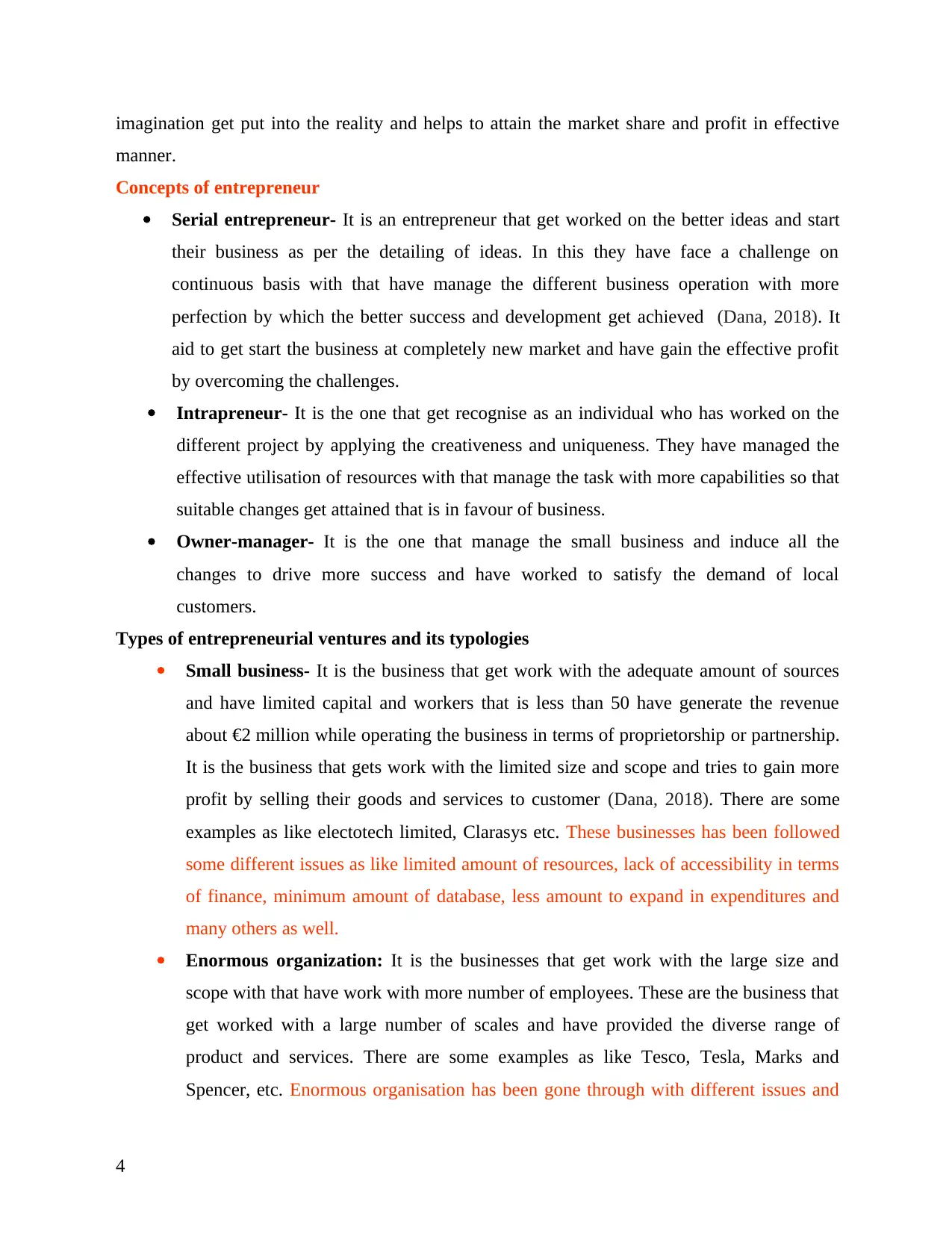
imagination get put into the reality and helps to attain the market share and profit in effective
manner.
Concepts of entrepreneur
Serial entrepreneur- It is an entrepreneur that get worked on the better ideas and start
their business as per the detailing of ideas. In this they have face a challenge on
continuous basis with that have manage the different business operation with more
perfection by which the better success and development get achieved (Dana, 2018). It
aid to get start the business at completely new market and have gain the effective profit
by overcoming the challenges.
Intrapreneur- It is the one that get recognise as an individual who has worked on the
different project by applying the creativeness and uniqueness. They have managed the
effective utilisation of resources with that manage the task with more capabilities so that
suitable changes get attained that is in favour of business.
Owner-manager- It is the one that manage the small business and induce all the
changes to drive more success and have worked to satisfy the demand of local
customers.
Types of entrepreneurial ventures and its typologies
Small business- It is the business that get work with the adequate amount of sources
and have limited capital and workers that is less than 50 have generate the revenue
about €2 million while operating the business in terms of proprietorship or partnership.
It is the business that gets work with the limited size and scope and tries to gain more
profit by selling their goods and services to customer (Dana, 2018). There are some
examples as like electotech limited, Clarasys etc. These businesses has been followed
some different issues as like limited amount of resources, lack of accessibility in terms
of finance, minimum amount of database, less amount to expand in expenditures and
many others as well.
Enormous organization: It is the businesses that get work with the large size and
scope with that have work with more number of employees. These are the business that
get worked with a large number of scales and have provided the diverse range of
product and services. There are some examples as like Tesco, Tesla, Marks and
Spencer, etc. Enormous organisation has been gone through with different issues and
4
manner.
Concepts of entrepreneur
Serial entrepreneur- It is an entrepreneur that get worked on the better ideas and start
their business as per the detailing of ideas. In this they have face a challenge on
continuous basis with that have manage the different business operation with more
perfection by which the better success and development get achieved (Dana, 2018). It
aid to get start the business at completely new market and have gain the effective profit
by overcoming the challenges.
Intrapreneur- It is the one that get recognise as an individual who has worked on the
different project by applying the creativeness and uniqueness. They have managed the
effective utilisation of resources with that manage the task with more capabilities so that
suitable changes get attained that is in favour of business.
Owner-manager- It is the one that manage the small business and induce all the
changes to drive more success and have worked to satisfy the demand of local
customers.
Types of entrepreneurial ventures and its typologies
Small business- It is the business that get work with the adequate amount of sources
and have limited capital and workers that is less than 50 have generate the revenue
about €2 million while operating the business in terms of proprietorship or partnership.
It is the business that gets work with the limited size and scope and tries to gain more
profit by selling their goods and services to customer (Dana, 2018). There are some
examples as like electotech limited, Clarasys etc. These businesses has been followed
some different issues as like limited amount of resources, lack of accessibility in terms
of finance, minimum amount of database, less amount to expand in expenditures and
many others as well.
Enormous organization: It is the businesses that get work with the large size and
scope with that have work with more number of employees. These are the business that
get worked with a large number of scales and have provided the diverse range of
product and services. There are some examples as like Tesco, Tesla, Marks and
Spencer, etc. Enormous organisation has been gone through with different issues and
4
Secure Best Marks with AI Grader
Need help grading? Try our AI Grader for instant feedback on your assignments.
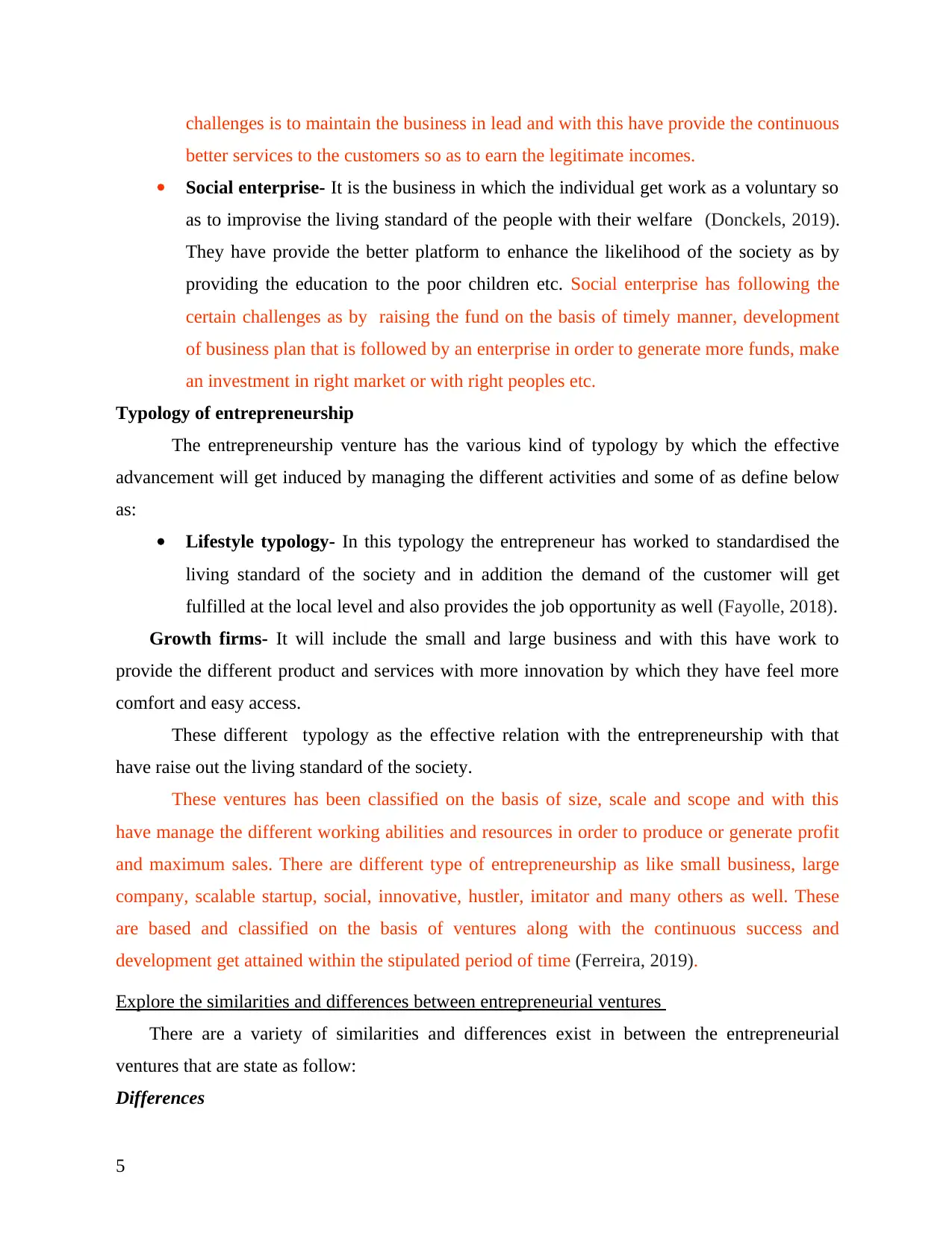
challenges is to maintain the business in lead and with this have provide the continuous
better services to the customers so as to earn the legitimate incomes.
Social enterprise- It is the business in which the individual get work as a voluntary so
as to improvise the living standard of the people with their welfare (Donckels, 2019).
They have provide the better platform to enhance the likelihood of the society as by
providing the education to the poor children etc. Social enterprise has following the
certain challenges as by raising the fund on the basis of timely manner, development
of business plan that is followed by an enterprise in order to generate more funds, make
an investment in right market or with right peoples etc.
Typology of entrepreneurship
The entrepreneurship venture has the various kind of typology by which the effective
advancement will get induced by managing the different activities and some of as define below
as:
Lifestyle typology- In this typology the entrepreneur has worked to standardised the
living standard of the society and in addition the demand of the customer will get
fulfilled at the local level and also provides the job opportunity as well (Fayolle, 2018).
Growth firms- It will include the small and large business and with this have work to
provide the different product and services with more innovation by which they have feel more
comfort and easy access.
These different typology as the effective relation with the entrepreneurship with that
have raise out the living standard of the society.
These ventures has been classified on the basis of size, scale and scope and with this
have manage the different working abilities and resources in order to produce or generate profit
and maximum sales. There are different type of entrepreneurship as like small business, large
company, scalable startup, social, innovative, hustler, imitator and many others as well. These
are based and classified on the basis of ventures along with the continuous success and
development get attained within the stipulated period of time (Ferreira, 2019).
Explore the similarities and differences between entrepreneurial ventures
There are a variety of similarities and differences exist in between the entrepreneurial
ventures that are state as follow:
Differences
5
better services to the customers so as to earn the legitimate incomes.
Social enterprise- It is the business in which the individual get work as a voluntary so
as to improvise the living standard of the people with their welfare (Donckels, 2019).
They have provide the better platform to enhance the likelihood of the society as by
providing the education to the poor children etc. Social enterprise has following the
certain challenges as by raising the fund on the basis of timely manner, development
of business plan that is followed by an enterprise in order to generate more funds, make
an investment in right market or with right peoples etc.
Typology of entrepreneurship
The entrepreneurship venture has the various kind of typology by which the effective
advancement will get induced by managing the different activities and some of as define below
as:
Lifestyle typology- In this typology the entrepreneur has worked to standardised the
living standard of the society and in addition the demand of the customer will get
fulfilled at the local level and also provides the job opportunity as well (Fayolle, 2018).
Growth firms- It will include the small and large business and with this have work to
provide the different product and services with more innovation by which they have feel more
comfort and easy access.
These different typology as the effective relation with the entrepreneurship with that
have raise out the living standard of the society.
These ventures has been classified on the basis of size, scale and scope and with this
have manage the different working abilities and resources in order to produce or generate profit
and maximum sales. There are different type of entrepreneurship as like small business, large
company, scalable startup, social, innovative, hustler, imitator and many others as well. These
are based and classified on the basis of ventures along with the continuous success and
development get attained within the stipulated period of time (Ferreira, 2019).
Explore the similarities and differences between entrepreneurial ventures
There are a variety of similarities and differences exist in between the entrepreneurial
ventures that are state as follow:
Differences
5
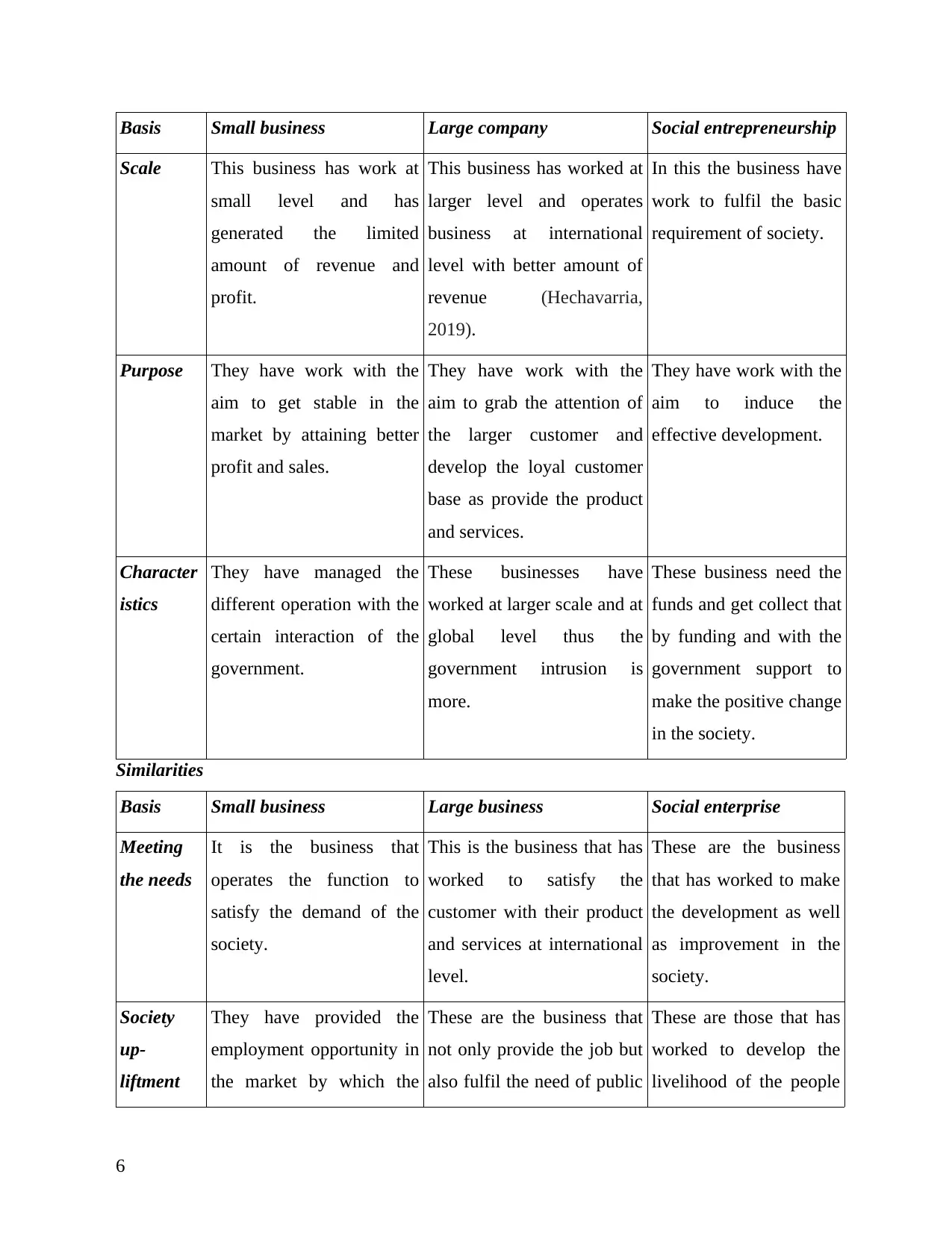
Basis Small business Large company Social entrepreneurship
Scale This business has work at
small level and has
generated the limited
amount of revenue and
profit.
This business has worked at
larger level and operates
business at international
level with better amount of
revenue (Hechavarria,
2019).
In this the business have
work to fulfil the basic
requirement of society.
Purpose They have work with the
aim to get stable in the
market by attaining better
profit and sales.
They have work with the
aim to grab the attention of
the larger customer and
develop the loyal customer
base as provide the product
and services.
They have work with the
aim to induce the
effective development.
Character
istics
They have managed the
different operation with the
certain interaction of the
government.
These businesses have
worked at larger scale and at
global level thus the
government intrusion is
more.
These business need the
funds and get collect that
by funding and with the
government support to
make the positive change
in the society.
Similarities
Basis Small business Large business Social enterprise
Meeting
the needs
It is the business that
operates the function to
satisfy the demand of the
society.
This is the business that has
worked to satisfy the
customer with their product
and services at international
level.
These are the business
that has worked to make
the development as well
as improvement in the
society.
Society
up-
liftment
They have provided the
employment opportunity in
the market by which the
These are the business that
not only provide the job but
also fulfil the need of public
These are those that has
worked to develop the
livelihood of the people
6
Scale This business has work at
small level and has
generated the limited
amount of revenue and
profit.
This business has worked at
larger level and operates
business at international
level with better amount of
revenue (Hechavarria,
2019).
In this the business have
work to fulfil the basic
requirement of society.
Purpose They have work with the
aim to get stable in the
market by attaining better
profit and sales.
They have work with the
aim to grab the attention of
the larger customer and
develop the loyal customer
base as provide the product
and services.
They have work with the
aim to induce the
effective development.
Character
istics
They have managed the
different operation with the
certain interaction of the
government.
These businesses have
worked at larger scale and at
global level thus the
government intrusion is
more.
These business need the
funds and get collect that
by funding and with the
government support to
make the positive change
in the society.
Similarities
Basis Small business Large business Social enterprise
Meeting
the needs
It is the business that
operates the function to
satisfy the demand of the
society.
This is the business that has
worked to satisfy the
customer with their product
and services at international
level.
These are the business
that has worked to make
the development as well
as improvement in the
society.
Society
up-
liftment
They have provided the
employment opportunity in
the market by which the
These are the business that
not only provide the job but
also fulfil the need of public
These are those that has
worked to develop the
livelihood of the people
6
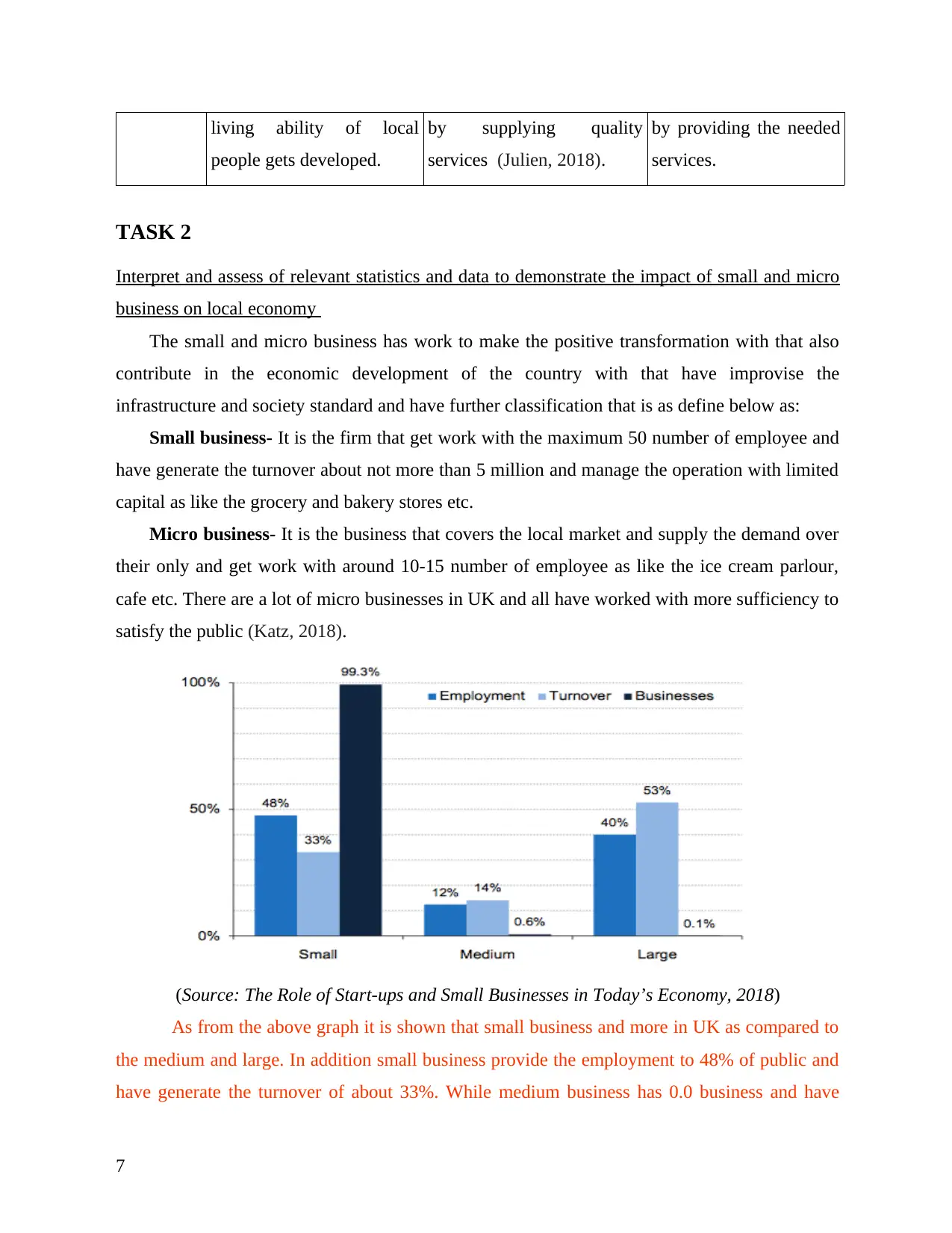
living ability of local
people gets developed.
by supplying quality
services (Julien, 2018).
by providing the needed
services.
TASK 2
Interpret and assess of relevant statistics and data to demonstrate the impact of small and micro
business on local economy
The small and micro business has work to make the positive transformation with that also
contribute in the economic development of the country with that have improvise the
infrastructure and society standard and have further classification that is as define below as:
Small business- It is the firm that get work with the maximum 50 number of employee and
have generate the turnover about not more than 5 million and manage the operation with limited
capital as like the grocery and bakery stores etc.
Micro business- It is the business that covers the local market and supply the demand over
their only and get work with around 10-15 number of employee as like the ice cream parlour,
cafe etc. There are a lot of micro businesses in UK and all have worked with more sufficiency to
satisfy the public (Katz, 2018).
(Source: The Role of Start-ups and Small Businesses in Today’s Economy, 2018)
As from the above graph it is shown that small business and more in UK as compared to
the medium and large. In addition small business provide the employment to 48% of public and
have generate the turnover of about 33%. While medium business has 0.0 business and have
7
people gets developed.
by supplying quality
services (Julien, 2018).
by providing the needed
services.
TASK 2
Interpret and assess of relevant statistics and data to demonstrate the impact of small and micro
business on local economy
The small and micro business has work to make the positive transformation with that also
contribute in the economic development of the country with that have improvise the
infrastructure and society standard and have further classification that is as define below as:
Small business- It is the firm that get work with the maximum 50 number of employee and
have generate the turnover about not more than 5 million and manage the operation with limited
capital as like the grocery and bakery stores etc.
Micro business- It is the business that covers the local market and supply the demand over
their only and get work with around 10-15 number of employee as like the ice cream parlour,
cafe etc. There are a lot of micro businesses in UK and all have worked with more sufficiency to
satisfy the public (Katz, 2018).
(Source: The Role of Start-ups and Small Businesses in Today’s Economy, 2018)
As from the above graph it is shown that small business and more in UK as compared to
the medium and large. In addition small business provide the employment to 48% of public and
have generate the turnover of about 33%. While medium business has 0.0 business and have
7
Paraphrase This Document
Need a fresh take? Get an instant paraphrase of this document with our AI Paraphraser
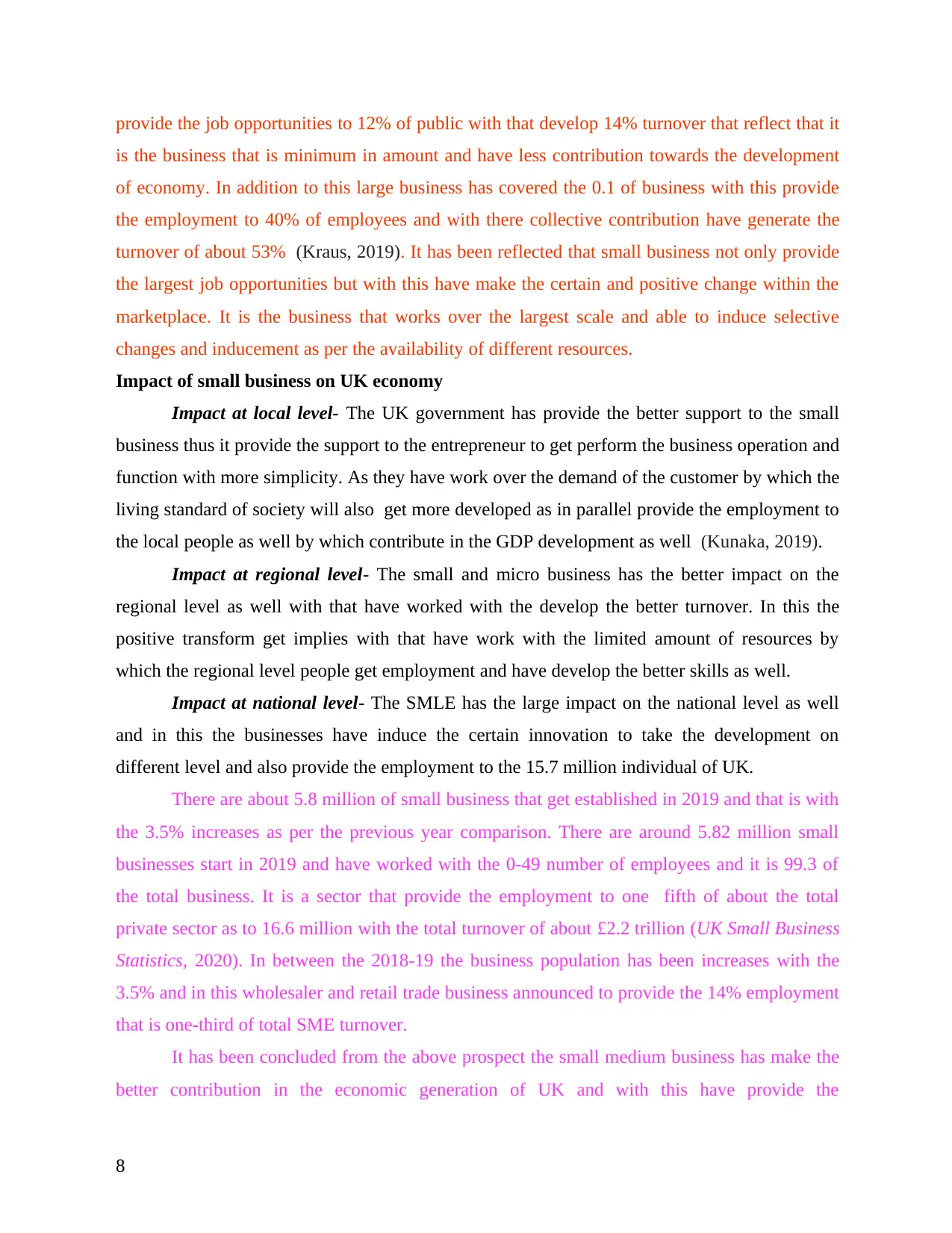
provide the job opportunities to 12% of public with that develop 14% turnover that reflect that it
is the business that is minimum in amount and have less contribution towards the development
of economy. In addition to this large business has covered the 0.1 of business with this provide
the employment to 40% of employees and with there collective contribution have generate the
turnover of about 53% (Kraus, 2019). It has been reflected that small business not only provide
the largest job opportunities but with this have make the certain and positive change within the
marketplace. It is the business that works over the largest scale and able to induce selective
changes and inducement as per the availability of different resources.
Impact of small business on UK economy
Impact at local level- The UK government has provide the better support to the small
business thus it provide the support to the entrepreneur to get perform the business operation and
function with more simplicity. As they have work over the demand of the customer by which the
living standard of society will also get more developed as in parallel provide the employment to
the local people as well by which contribute in the GDP development as well (Kunaka, 2019).
Impact at regional level- The small and micro business has the better impact on the
regional level as well with that have worked with the develop the better turnover. In this the
positive transform get implies with that have work with the limited amount of resources by
which the regional level people get employment and have develop the better skills as well.
Impact at national level- The SMLE has the large impact on the national level as well
and in this the businesses have induce the certain innovation to take the development on
different level and also provide the employment to the 15.7 million individual of UK.
There are about 5.8 million of small business that get established in 2019 and that is with
the 3.5% increases as per the previous year comparison. There are around 5.82 million small
businesses start in 2019 and have worked with the 0-49 number of employees and it is 99.3 of
the total business. It is a sector that provide the employment to one fifth of about the total
private sector as to 16.6 million with the total turnover of about £2.2 trillion (UK Small Business
Statistics, 2020). In between the 2018-19 the business population has been increases with the
3.5% and in this wholesaler and retail trade business announced to provide the 14% employment
that is one-third of total SME turnover.
It has been concluded from the above prospect the small medium business has make the
better contribution in the economic generation of UK and with this have provide the
8
is the business that is minimum in amount and have less contribution towards the development
of economy. In addition to this large business has covered the 0.1 of business with this provide
the employment to 40% of employees and with there collective contribution have generate the
turnover of about 53% (Kraus, 2019). It has been reflected that small business not only provide
the largest job opportunities but with this have make the certain and positive change within the
marketplace. It is the business that works over the largest scale and able to induce selective
changes and inducement as per the availability of different resources.
Impact of small business on UK economy
Impact at local level- The UK government has provide the better support to the small
business thus it provide the support to the entrepreneur to get perform the business operation and
function with more simplicity. As they have work over the demand of the customer by which the
living standard of society will also get more developed as in parallel provide the employment to
the local people as well by which contribute in the GDP development as well (Kunaka, 2019).
Impact at regional level- The small and micro business has the better impact on the
regional level as well with that have worked with the develop the better turnover. In this the
positive transform get implies with that have work with the limited amount of resources by
which the regional level people get employment and have develop the better skills as well.
Impact at national level- The SMLE has the large impact on the national level as well
and in this the businesses have induce the certain innovation to take the development on
different level and also provide the employment to the 15.7 million individual of UK.
There are about 5.8 million of small business that get established in 2019 and that is with
the 3.5% increases as per the previous year comparison. There are around 5.82 million small
businesses start in 2019 and have worked with the 0-49 number of employees and it is 99.3 of
the total business. It is a sector that provide the employment to one fifth of about the total
private sector as to 16.6 million with the total turnover of about £2.2 trillion (UK Small Business
Statistics, 2020). In between the 2018-19 the business population has been increases with the
3.5% and in this wholesaler and retail trade business announced to provide the 14% employment
that is one-third of total SME turnover.
It has been concluded from the above prospect the small medium business has make the
better contribution in the economic generation of UK and with this have provide the
8
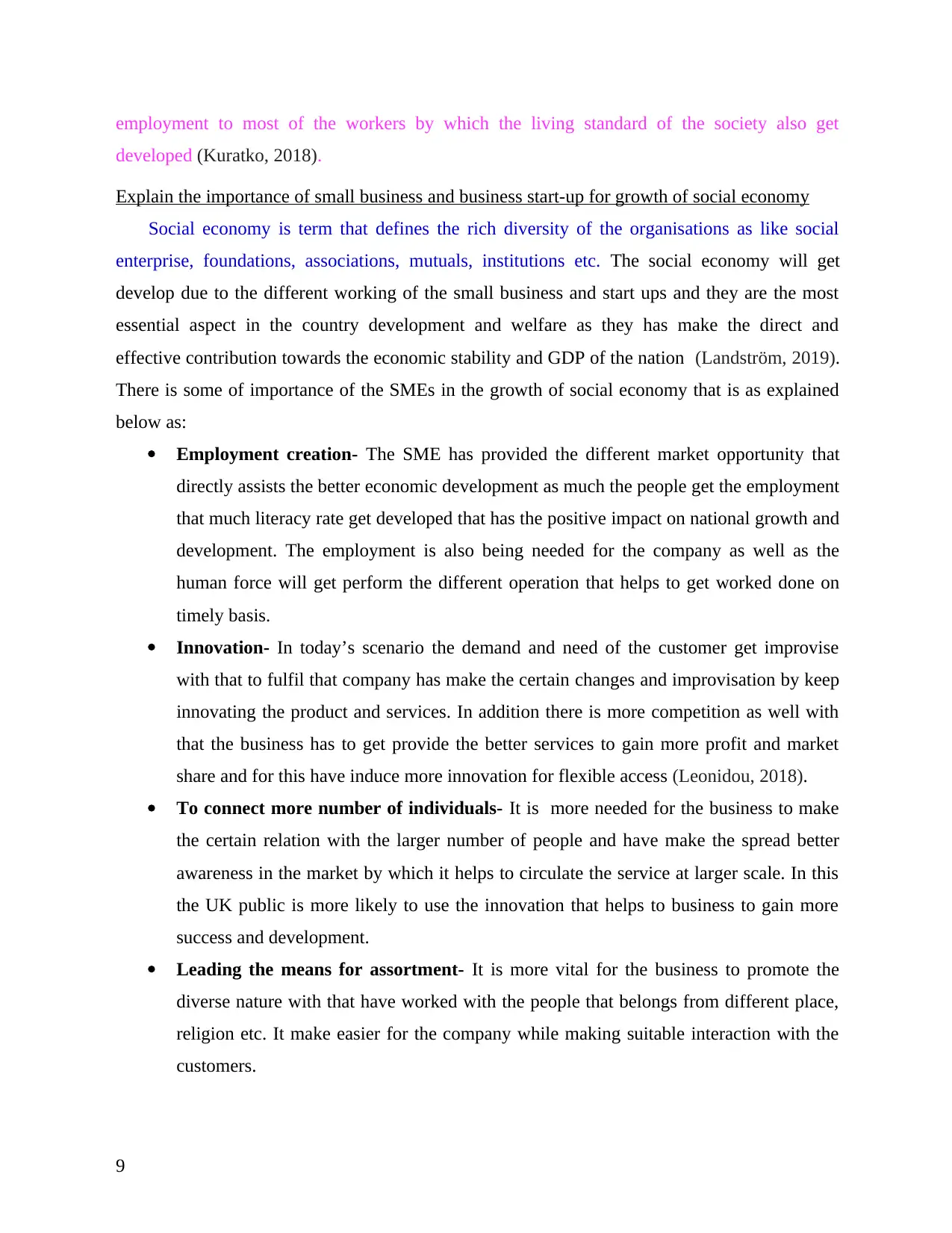
employment to most of the workers by which the living standard of the society also get
developed (Kuratko, 2018).
Explain the importance of small business and business start-up for growth of social economy
Social economy is term that defines the rich diversity of the organisations as like social
enterprise, foundations, associations, mutuals, institutions etc. The social economy will get
develop due to the different working of the small business and start ups and they are the most
essential aspect in the country development and welfare as they has make the direct and
effective contribution towards the economic stability and GDP of the nation (Landström, 2019).
There is some of importance of the SMEs in the growth of social economy that is as explained
below as:
Employment creation- The SME has provided the different market opportunity that
directly assists the better economic development as much the people get the employment
that much literacy rate get developed that has the positive impact on national growth and
development. The employment is also being needed for the company as well as the
human force will get perform the different operation that helps to get worked done on
timely basis.
Innovation- In today’s scenario the demand and need of the customer get improvise
with that to fulfil that company has make the certain changes and improvisation by keep
innovating the product and services. In addition there is more competition as well with
that the business has to get provide the better services to gain more profit and market
share and for this have induce more innovation for flexible access (Leonidou, 2018).
To connect more number of individuals- It is more needed for the business to make
the certain relation with the larger number of people and have make the spread better
awareness in the market by which it helps to circulate the service at larger scale. In this
the UK public is more likely to use the innovation that helps to business to gain more
success and development.
Leading the means for assortment- It is more vital for the business to promote the
diverse nature with that have worked with the people that belongs from different place,
religion etc. It make easier for the company while making suitable interaction with the
customers.
9
developed (Kuratko, 2018).
Explain the importance of small business and business start-up for growth of social economy
Social economy is term that defines the rich diversity of the organisations as like social
enterprise, foundations, associations, mutuals, institutions etc. The social economy will get
develop due to the different working of the small business and start ups and they are the most
essential aspect in the country development and welfare as they has make the direct and
effective contribution towards the economic stability and GDP of the nation (Landström, 2019).
There is some of importance of the SMEs in the growth of social economy that is as explained
below as:
Employment creation- The SME has provided the different market opportunity that
directly assists the better economic development as much the people get the employment
that much literacy rate get developed that has the positive impact on national growth and
development. The employment is also being needed for the company as well as the
human force will get perform the different operation that helps to get worked done on
timely basis.
Innovation- In today’s scenario the demand and need of the customer get improvise
with that to fulfil that company has make the certain changes and improvisation by keep
innovating the product and services. In addition there is more competition as well with
that the business has to get provide the better services to gain more profit and market
share and for this have induce more innovation for flexible access (Leonidou, 2018).
To connect more number of individuals- It is more needed for the business to make
the certain relation with the larger number of people and have make the spread better
awareness in the market by which it helps to circulate the service at larger scale. In this
the UK public is more likely to use the innovation that helps to business to gain more
success and development.
Leading the means for assortment- It is more vital for the business to promote the
diverse nature with that have worked with the people that belongs from different place,
religion etc. It make easier for the company while making suitable interaction with the
customers.
9
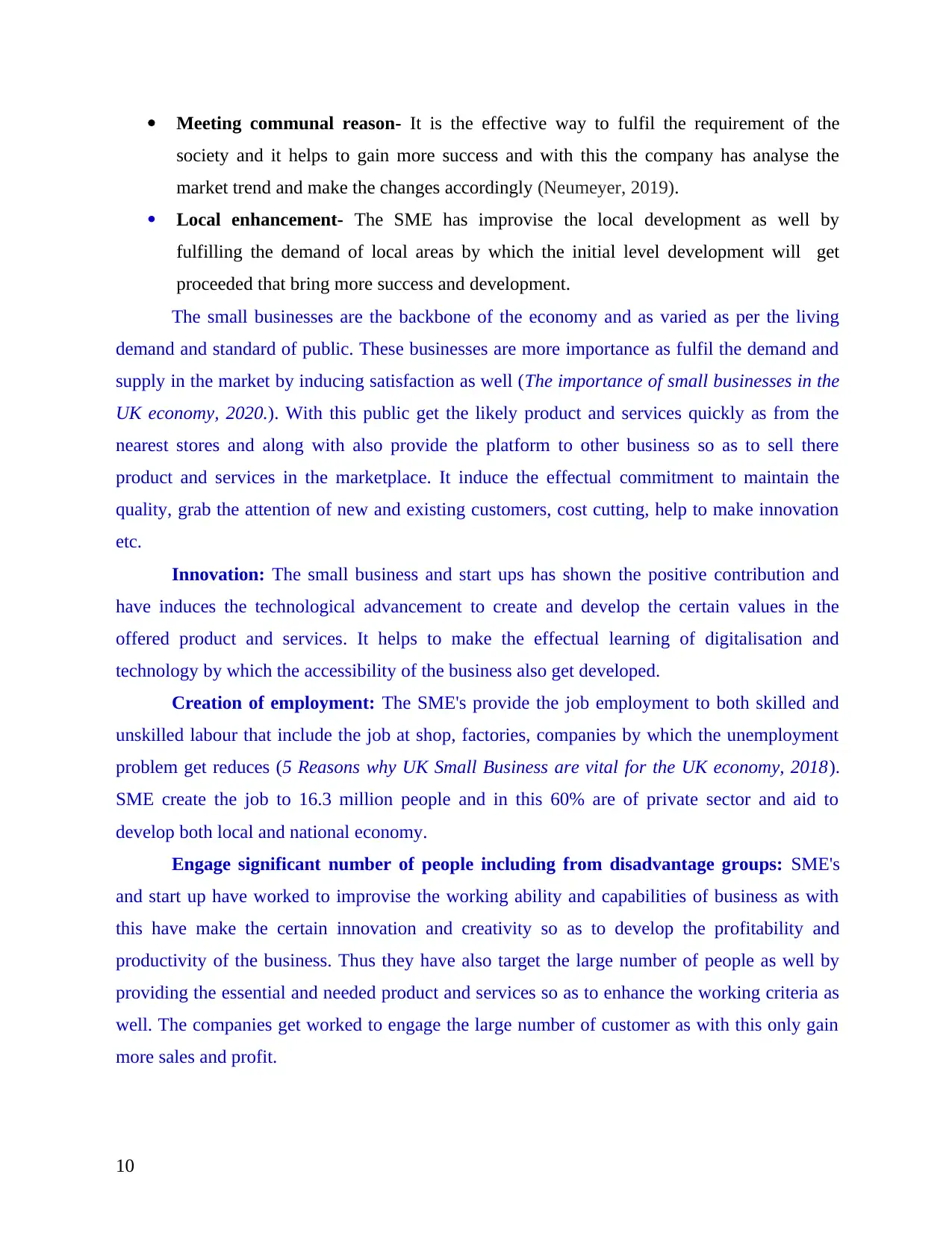
Meeting communal reason- It is the effective way to fulfil the requirement of the
society and it helps to gain more success and with this the company has analyse the
market trend and make the changes accordingly (Neumeyer, 2019).
Local enhancement- The SME has improvise the local development as well by
fulfilling the demand of local areas by which the initial level development will get
proceeded that bring more success and development.
The small businesses are the backbone of the economy and as varied as per the living
demand and standard of public. These businesses are more importance as fulfil the demand and
supply in the market by inducing satisfaction as well (The importance of small businesses in the
UK economy, 2020.). With this public get the likely product and services quickly as from the
nearest stores and along with also provide the platform to other business so as to sell there
product and services in the marketplace. It induce the effectual commitment to maintain the
quality, grab the attention of new and existing customers, cost cutting, help to make innovation
etc.
Innovation: The small business and start ups has shown the positive contribution and
have induces the technological advancement to create and develop the certain values in the
offered product and services. It helps to make the effectual learning of digitalisation and
technology by which the accessibility of the business also get developed.
Creation of employment: The SME's provide the job employment to both skilled and
unskilled labour that include the job at shop, factories, companies by which the unemployment
problem get reduces (5 Reasons why UK Small Business are vital for the UK economy, 2018).
SME create the job to 16.3 million people and in this 60% are of private sector and aid to
develop both local and national economy.
Engage significant number of people including from disadvantage groups: SME's
and start up have worked to improvise the working ability and capabilities of business as with
this have make the certain innovation and creativity so as to develop the profitability and
productivity of the business. Thus they have also target the large number of people as well by
providing the essential and needed product and services so as to enhance the working criteria as
well. The companies get worked to engage the large number of customer as with this only gain
more sales and profit.
10
society and it helps to gain more success and with this the company has analyse the
market trend and make the changes accordingly (Neumeyer, 2019).
Local enhancement- The SME has improvise the local development as well by
fulfilling the demand of local areas by which the initial level development will get
proceeded that bring more success and development.
The small businesses are the backbone of the economy and as varied as per the living
demand and standard of public. These businesses are more importance as fulfil the demand and
supply in the market by inducing satisfaction as well (The importance of small businesses in the
UK economy, 2020.). With this public get the likely product and services quickly as from the
nearest stores and along with also provide the platform to other business so as to sell there
product and services in the marketplace. It induce the effectual commitment to maintain the
quality, grab the attention of new and existing customers, cost cutting, help to make innovation
etc.
Innovation: The small business and start ups has shown the positive contribution and
have induces the technological advancement to create and develop the certain values in the
offered product and services. It helps to make the effectual learning of digitalisation and
technology by which the accessibility of the business also get developed.
Creation of employment: The SME's provide the job employment to both skilled and
unskilled labour that include the job at shop, factories, companies by which the unemployment
problem get reduces (5 Reasons why UK Small Business are vital for the UK economy, 2018).
SME create the job to 16.3 million people and in this 60% are of private sector and aid to
develop both local and national economy.
Engage significant number of people including from disadvantage groups: SME's
and start up have worked to improvise the working ability and capabilities of business as with
this have make the certain innovation and creativity so as to develop the profitability and
productivity of the business. Thus they have also target the large number of people as well by
providing the essential and needed product and services so as to enhance the working criteria as
well. The companies get worked to engage the large number of customer as with this only gain
more sales and profit.
10
Secure Best Marks with AI Grader
Need help grading? Try our AI Grader for instant feedback on your assignments.
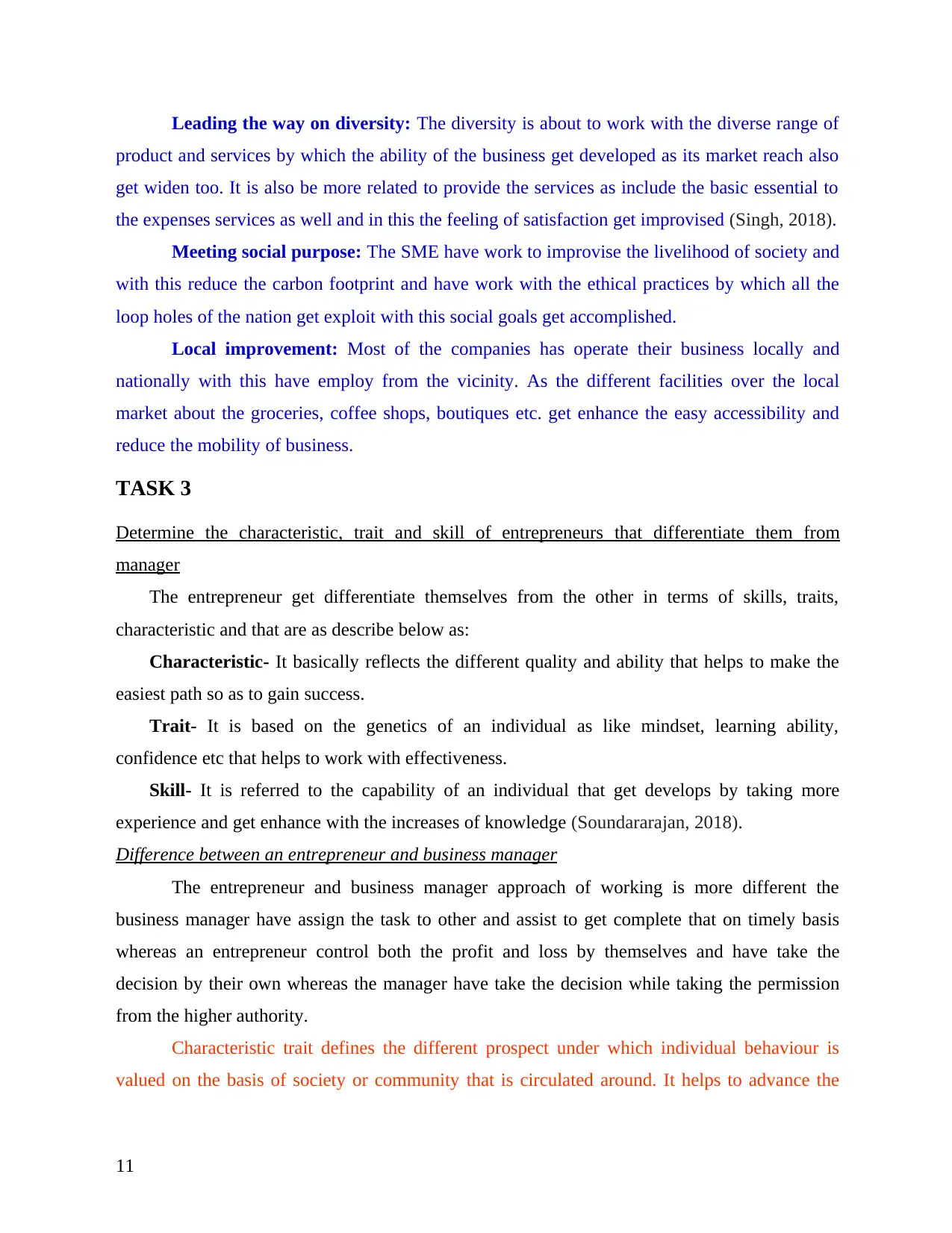
Leading the way on diversity: The diversity is about to work with the diverse range of
product and services by which the ability of the business get developed as its market reach also
get widen too. It is also be more related to provide the services as include the basic essential to
the expenses services as well and in this the feeling of satisfaction get improvised (Singh, 2018).
Meeting social purpose: The SME have work to improvise the livelihood of society and
with this reduce the carbon footprint and have work with the ethical practices by which all the
loop holes of the nation get exploit with this social goals get accomplished.
Local improvement: Most of the companies has operate their business locally and
nationally with this have employ from the vicinity. As the different facilities over the local
market about the groceries, coffee shops, boutiques etc. get enhance the easy accessibility and
reduce the mobility of business.
TASK 3
Determine the characteristic, trait and skill of entrepreneurs that differentiate them from
manager
The entrepreneur get differentiate themselves from the other in terms of skills, traits,
characteristic and that are as describe below as:
Characteristic- It basically reflects the different quality and ability that helps to make the
easiest path so as to gain success.
Trait- It is based on the genetics of an individual as like mindset, learning ability,
confidence etc that helps to work with effectiveness.
Skill- It is referred to the capability of an individual that get develops by taking more
experience and get enhance with the increases of knowledge (Soundararajan, 2018).
Difference between an entrepreneur and business manager
The entrepreneur and business manager approach of working is more different the
business manager have assign the task to other and assist to get complete that on timely basis
whereas an entrepreneur control both the profit and loss by themselves and have take the
decision by their own whereas the manager have take the decision while taking the permission
from the higher authority.
Characteristic trait defines the different prospect under which individual behaviour is
valued on the basis of society or community that is circulated around. It helps to advance the
11
product and services by which the ability of the business get developed as its market reach also
get widen too. It is also be more related to provide the services as include the basic essential to
the expenses services as well and in this the feeling of satisfaction get improvised (Singh, 2018).
Meeting social purpose: The SME have work to improvise the livelihood of society and
with this reduce the carbon footprint and have work with the ethical practices by which all the
loop holes of the nation get exploit with this social goals get accomplished.
Local improvement: Most of the companies has operate their business locally and
nationally with this have employ from the vicinity. As the different facilities over the local
market about the groceries, coffee shops, boutiques etc. get enhance the easy accessibility and
reduce the mobility of business.
TASK 3
Determine the characteristic, trait and skill of entrepreneurs that differentiate them from
manager
The entrepreneur get differentiate themselves from the other in terms of skills, traits,
characteristic and that are as describe below as:
Characteristic- It basically reflects the different quality and ability that helps to make the
easiest path so as to gain success.
Trait- It is based on the genetics of an individual as like mindset, learning ability,
confidence etc that helps to work with effectiveness.
Skill- It is referred to the capability of an individual that get develops by taking more
experience and get enhance with the increases of knowledge (Soundararajan, 2018).
Difference between an entrepreneur and business manager
The entrepreneur and business manager approach of working is more different the
business manager have assign the task to other and assist to get complete that on timely basis
whereas an entrepreneur control both the profit and loss by themselves and have take the
decision by their own whereas the manager have take the decision while taking the permission
from the higher authority.
Characteristic trait defines the different prospect under which individual behaviour is
valued on the basis of society or community that is circulated around. It helps to advance the
11
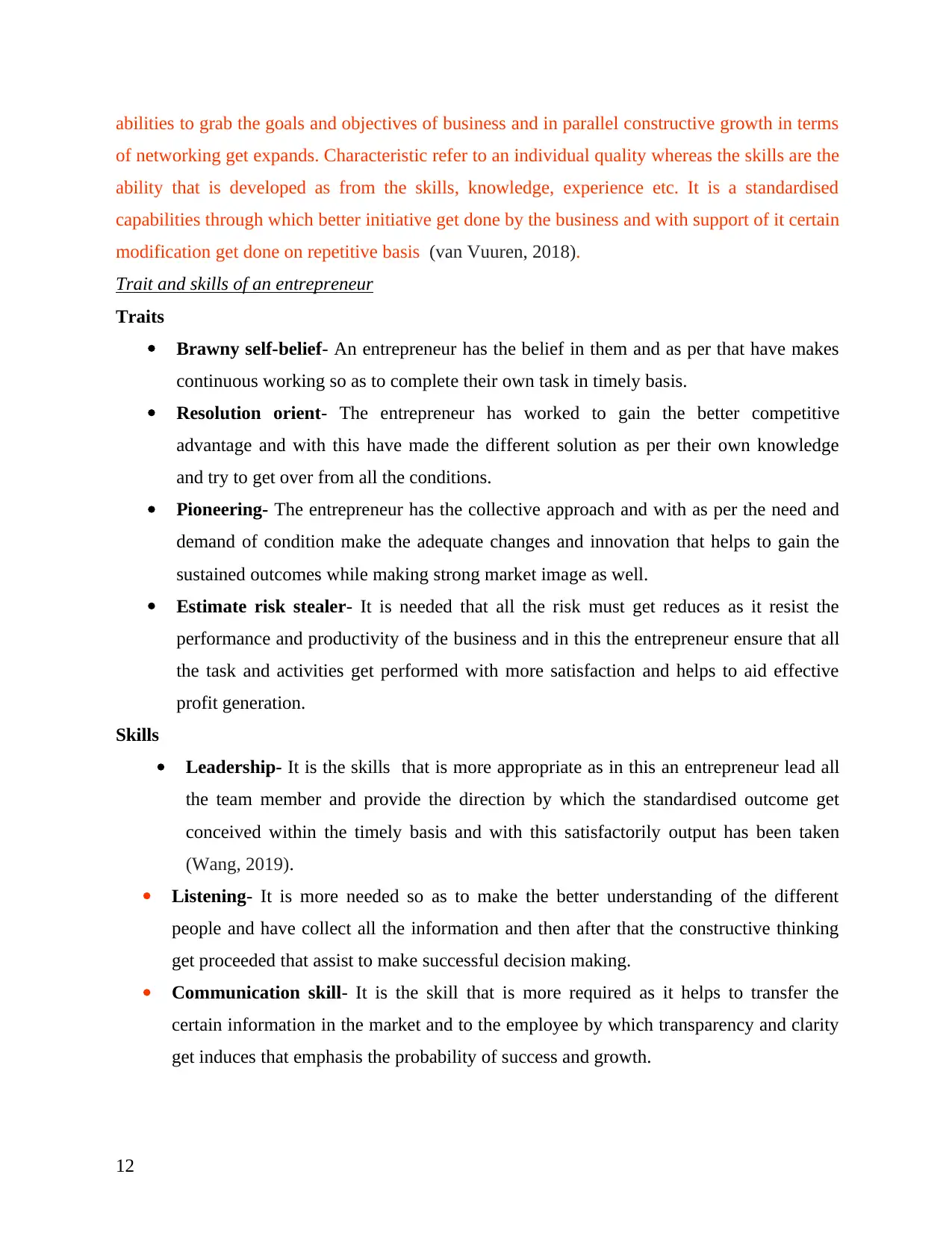
abilities to grab the goals and objectives of business and in parallel constructive growth in terms
of networking get expands. Characteristic refer to an individual quality whereas the skills are the
ability that is developed as from the skills, knowledge, experience etc. It is a standardised
capabilities through which better initiative get done by the business and with support of it certain
modification get done on repetitive basis (van Vuuren, 2018).
Trait and skills of an entrepreneur
Traits
Brawny self-belief- An entrepreneur has the belief in them and as per that have makes
continuous working so as to complete their own task in timely basis.
Resolution orient- The entrepreneur has worked to gain the better competitive
advantage and with this have made the different solution as per their own knowledge
and try to get over from all the conditions.
Pioneering- The entrepreneur has the collective approach and with as per the need and
demand of condition make the adequate changes and innovation that helps to gain the
sustained outcomes while making strong market image as well.
Estimate risk stealer- It is needed that all the risk must get reduces as it resist the
performance and productivity of the business and in this the entrepreneur ensure that all
the task and activities get performed with more satisfaction and helps to aid effective
profit generation.
Skills
Leadership- It is the skills that is more appropriate as in this an entrepreneur lead all
the team member and provide the direction by which the standardised outcome get
conceived within the timely basis and with this satisfactorily output has been taken
(Wang, 2019).
Listening- It is more needed so as to make the better understanding of the different
people and have collect all the information and then after that the constructive thinking
get proceeded that assist to make successful decision making.
Communication skill- It is the skill that is more required as it helps to transfer the
certain information in the market and to the employee by which transparency and clarity
get induces that emphasis the probability of success and growth.
12
of networking get expands. Characteristic refer to an individual quality whereas the skills are the
ability that is developed as from the skills, knowledge, experience etc. It is a standardised
capabilities through which better initiative get done by the business and with support of it certain
modification get done on repetitive basis (van Vuuren, 2018).
Trait and skills of an entrepreneur
Traits
Brawny self-belief- An entrepreneur has the belief in them and as per that have makes
continuous working so as to complete their own task in timely basis.
Resolution orient- The entrepreneur has worked to gain the better competitive
advantage and with this have made the different solution as per their own knowledge
and try to get over from all the conditions.
Pioneering- The entrepreneur has the collective approach and with as per the need and
demand of condition make the adequate changes and innovation that helps to gain the
sustained outcomes while making strong market image as well.
Estimate risk stealer- It is needed that all the risk must get reduces as it resist the
performance and productivity of the business and in this the entrepreneur ensure that all
the task and activities get performed with more satisfaction and helps to aid effective
profit generation.
Skills
Leadership- It is the skills that is more appropriate as in this an entrepreneur lead all
the team member and provide the direction by which the standardised outcome get
conceived within the timely basis and with this satisfactorily output has been taken
(Wang, 2019).
Listening- It is more needed so as to make the better understanding of the different
people and have collect all the information and then after that the constructive thinking
get proceeded that assist to make successful decision making.
Communication skill- It is the skill that is more required as it helps to transfer the
certain information in the market and to the employee by which transparency and clarity
get induces that emphasis the probability of success and growth.
12
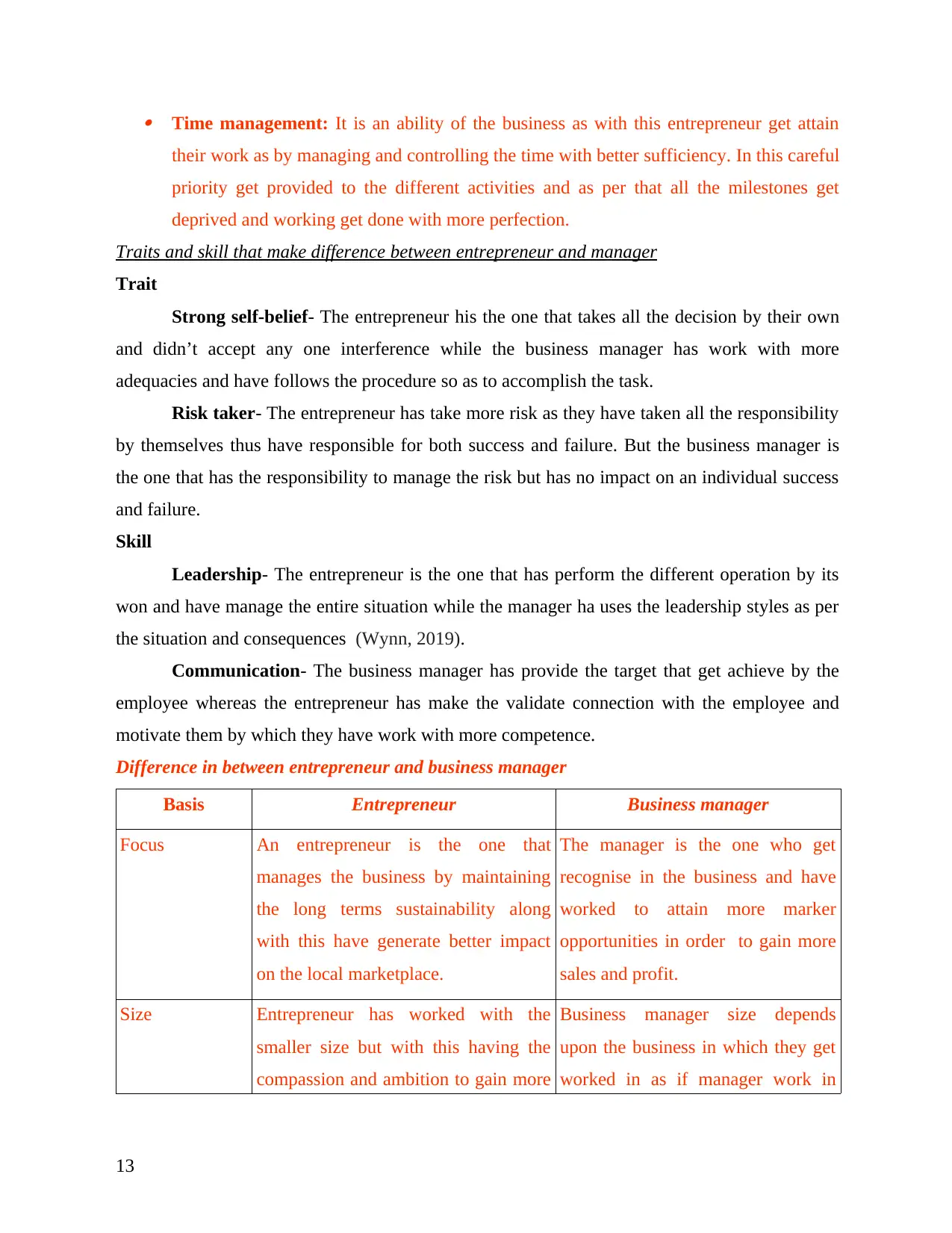
Time management: It is an ability of the business as with this entrepreneur get attain
their work as by managing and controlling the time with better sufficiency. In this careful
priority get provided to the different activities and as per that all the milestones get
deprived and working get done with more perfection.
Traits and skill that make difference between entrepreneur and manager
Trait
Strong self-belief- The entrepreneur his the one that takes all the decision by their own
and didn’t accept any one interference while the business manager has work with more
adequacies and have follows the procedure so as to accomplish the task.
Risk taker- The entrepreneur has take more risk as they have taken all the responsibility
by themselves thus have responsible for both success and failure. But the business manager is
the one that has the responsibility to manage the risk but has no impact on an individual success
and failure.
Skill
Leadership- The entrepreneur is the one that has perform the different operation by its
won and have manage the entire situation while the manager ha uses the leadership styles as per
the situation and consequences (Wynn, 2019).
Communication- The business manager has provide the target that get achieve by the
employee whereas the entrepreneur has make the validate connection with the employee and
motivate them by which they have work with more competence.
Difference in between entrepreneur and business manager
Basis Entrepreneur Business manager
Focus An entrepreneur is the one that
manages the business by maintaining
the long terms sustainability along
with this have generate better impact
on the local marketplace.
The manager is the one who get
recognise in the business and have
worked to attain more marker
opportunities in order to gain more
sales and profit.
Size Entrepreneur has worked with the
smaller size but with this having the
compassion and ambition to gain more
Business manager size depends
upon the business in which they get
worked in as if manager work in
13
their work as by managing and controlling the time with better sufficiency. In this careful
priority get provided to the different activities and as per that all the milestones get
deprived and working get done with more perfection.
Traits and skill that make difference between entrepreneur and manager
Trait
Strong self-belief- The entrepreneur his the one that takes all the decision by their own
and didn’t accept any one interference while the business manager has work with more
adequacies and have follows the procedure so as to accomplish the task.
Risk taker- The entrepreneur has take more risk as they have taken all the responsibility
by themselves thus have responsible for both success and failure. But the business manager is
the one that has the responsibility to manage the risk but has no impact on an individual success
and failure.
Skill
Leadership- The entrepreneur is the one that has perform the different operation by its
won and have manage the entire situation while the manager ha uses the leadership styles as per
the situation and consequences (Wynn, 2019).
Communication- The business manager has provide the target that get achieve by the
employee whereas the entrepreneur has make the validate connection with the employee and
motivate them by which they have work with more competence.
Difference in between entrepreneur and business manager
Basis Entrepreneur Business manager
Focus An entrepreneur is the one that
manages the business by maintaining
the long terms sustainability along
with this have generate better impact
on the local marketplace.
The manager is the one who get
recognise in the business and have
worked to attain more marker
opportunities in order to gain more
sales and profit.
Size Entrepreneur has worked with the
smaller size but with this having the
compassion and ambition to gain more
Business manager size depends
upon the business in which they get
worked in as if manager work in
13
Paraphrase This Document
Need a fresh take? Get an instant paraphrase of this document with our AI Paraphraser
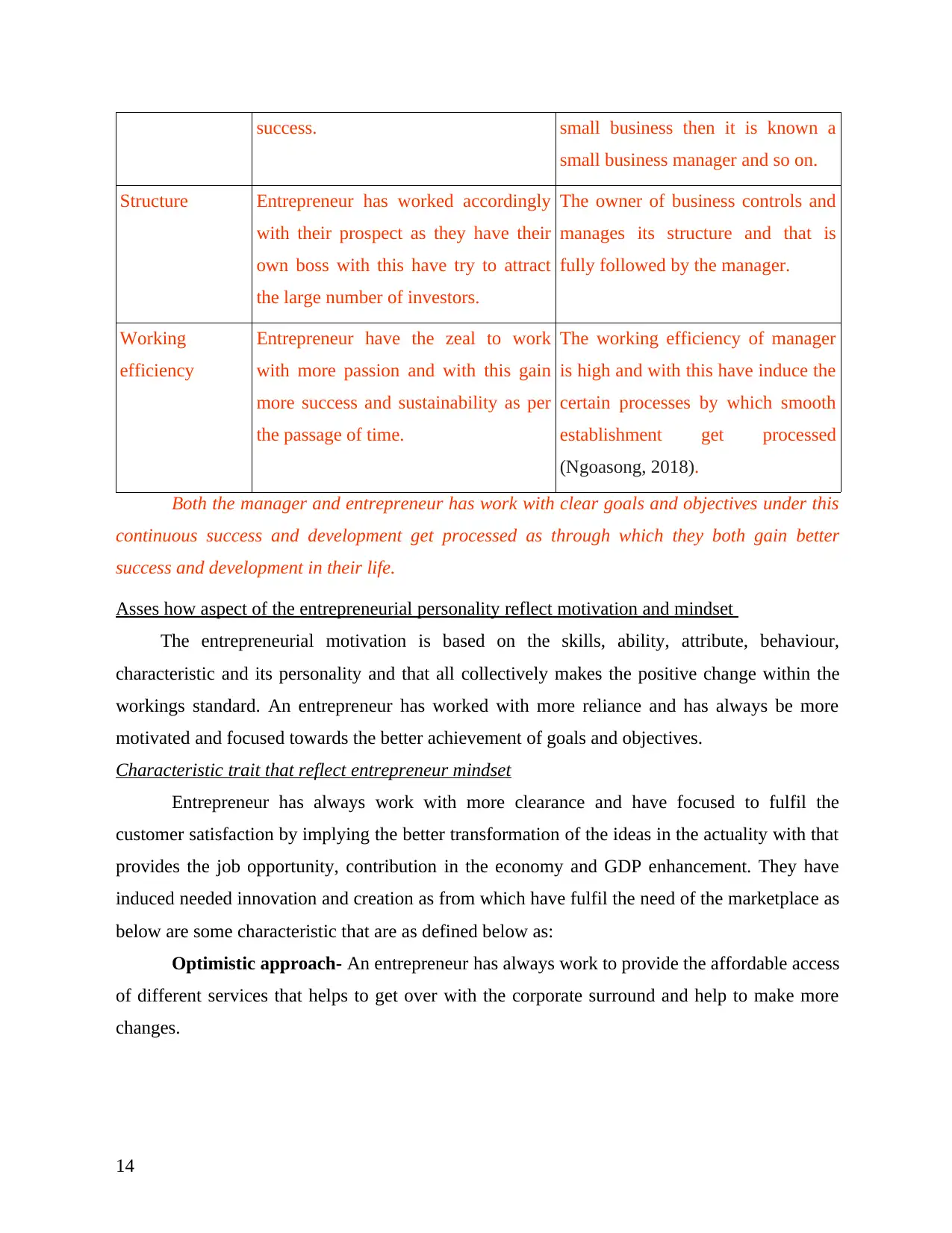
success. small business then it is known a
small business manager and so on.
Structure Entrepreneur has worked accordingly
with their prospect as they have their
own boss with this have try to attract
the large number of investors.
The owner of business controls and
manages its structure and that is
fully followed by the manager.
Working
efficiency
Entrepreneur have the zeal to work
with more passion and with this gain
more success and sustainability as per
the passage of time.
The working efficiency of manager
is high and with this have induce the
certain processes by which smooth
establishment get processed
(Ngoasong, 2018).
Both the manager and entrepreneur has work with clear goals and objectives under this
continuous success and development get processed as through which they both gain better
success and development in their life.
Asses how aspect of the entrepreneurial personality reflect motivation and mindset
The entrepreneurial motivation is based on the skills, ability, attribute, behaviour,
characteristic and its personality and that all collectively makes the positive change within the
workings standard. An entrepreneur has worked with more reliance and has always be more
motivated and focused towards the better achievement of goals and objectives.
Characteristic trait that reflect entrepreneur mindset
Entrepreneur has always work with more clearance and have focused to fulfil the
customer satisfaction by implying the better transformation of the ideas in the actuality with that
provides the job opportunity, contribution in the economy and GDP enhancement. They have
induced needed innovation and creation as from which have fulfil the need of the marketplace as
below are some characteristic that are as defined below as:
Optimistic approach- An entrepreneur has always work to provide the affordable access
of different services that helps to get over with the corporate surround and help to make more
changes.
14
small business manager and so on.
Structure Entrepreneur has worked accordingly
with their prospect as they have their
own boss with this have try to attract
the large number of investors.
The owner of business controls and
manages its structure and that is
fully followed by the manager.
Working
efficiency
Entrepreneur have the zeal to work
with more passion and with this gain
more success and sustainability as per
the passage of time.
The working efficiency of manager
is high and with this have induce the
certain processes by which smooth
establishment get processed
(Ngoasong, 2018).
Both the manager and entrepreneur has work with clear goals and objectives under this
continuous success and development get processed as through which they both gain better
success and development in their life.
Asses how aspect of the entrepreneurial personality reflect motivation and mindset
The entrepreneurial motivation is based on the skills, ability, attribute, behaviour,
characteristic and its personality and that all collectively makes the positive change within the
workings standard. An entrepreneur has worked with more reliance and has always be more
motivated and focused towards the better achievement of goals and objectives.
Characteristic trait that reflect entrepreneur mindset
Entrepreneur has always work with more clearance and have focused to fulfil the
customer satisfaction by implying the better transformation of the ideas in the actuality with that
provides the job opportunity, contribution in the economy and GDP enhancement. They have
induced needed innovation and creation as from which have fulfil the need of the marketplace as
below are some characteristic that are as defined below as:
Optimistic approach- An entrepreneur has always work to provide the affordable access
of different services that helps to get over with the corporate surround and help to make more
changes.
14
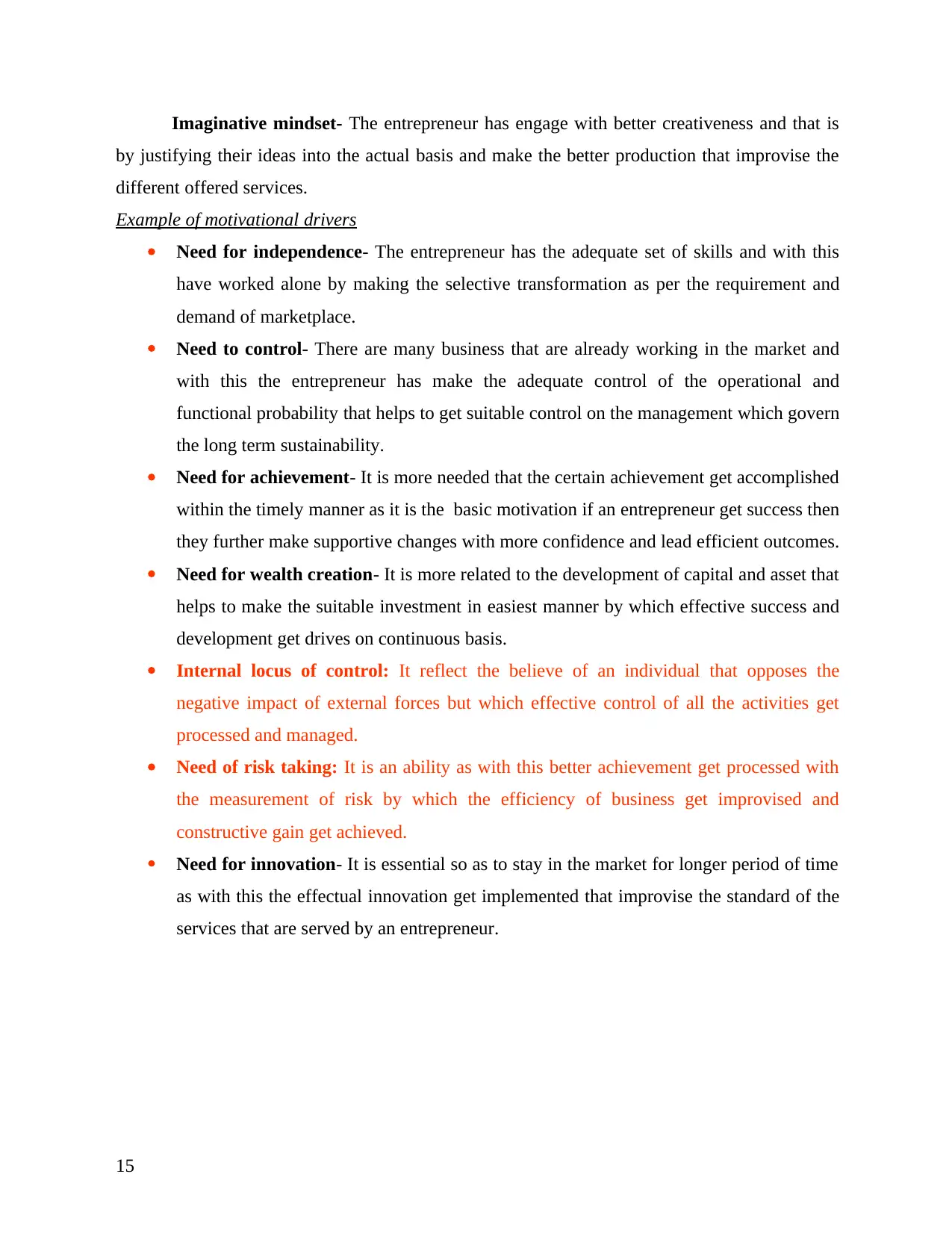
Imaginative mindset- The entrepreneur has engage with better creativeness and that is
by justifying their ideas into the actual basis and make the better production that improvise the
different offered services.
Example of motivational drivers
Need for independence- The entrepreneur has the adequate set of skills and with this
have worked alone by making the selective transformation as per the requirement and
demand of marketplace.
Need to control- There are many business that are already working in the market and
with this the entrepreneur has make the adequate control of the operational and
functional probability that helps to get suitable control on the management which govern
the long term sustainability.
Need for achievement- It is more needed that the certain achievement get accomplished
within the timely manner as it is the basic motivation if an entrepreneur get success then
they further make supportive changes with more confidence and lead efficient outcomes.
Need for wealth creation- It is more related to the development of capital and asset that
helps to make the suitable investment in easiest manner by which effective success and
development get drives on continuous basis.
Internal locus of control: It reflect the believe of an individual that opposes the
negative impact of external forces but which effective control of all the activities get
processed and managed.
Need of risk taking: It is an ability as with this better achievement get processed with
the measurement of risk by which the efficiency of business get improvised and
constructive gain get achieved.
Need for innovation- It is essential so as to stay in the market for longer period of time
as with this the effectual innovation get implemented that improvise the standard of the
services that are served by an entrepreneur.
15
by justifying their ideas into the actual basis and make the better production that improvise the
different offered services.
Example of motivational drivers
Need for independence- The entrepreneur has the adequate set of skills and with this
have worked alone by making the selective transformation as per the requirement and
demand of marketplace.
Need to control- There are many business that are already working in the market and
with this the entrepreneur has make the adequate control of the operational and
functional probability that helps to get suitable control on the management which govern
the long term sustainability.
Need for achievement- It is more needed that the certain achievement get accomplished
within the timely manner as it is the basic motivation if an entrepreneur get success then
they further make supportive changes with more confidence and lead efficient outcomes.
Need for wealth creation- It is more related to the development of capital and asset that
helps to make the suitable investment in easiest manner by which effective success and
development get drives on continuous basis.
Internal locus of control: It reflect the believe of an individual that opposes the
negative impact of external forces but which effective control of all the activities get
processed and managed.
Need of risk taking: It is an ability as with this better achievement get processed with
the measurement of risk by which the efficiency of business get improvised and
constructive gain get achieved.
Need for innovation- It is essential so as to stay in the market for longer period of time
as with this the effectual innovation get implemented that improvise the standard of the
services that are served by an entrepreneur.
15
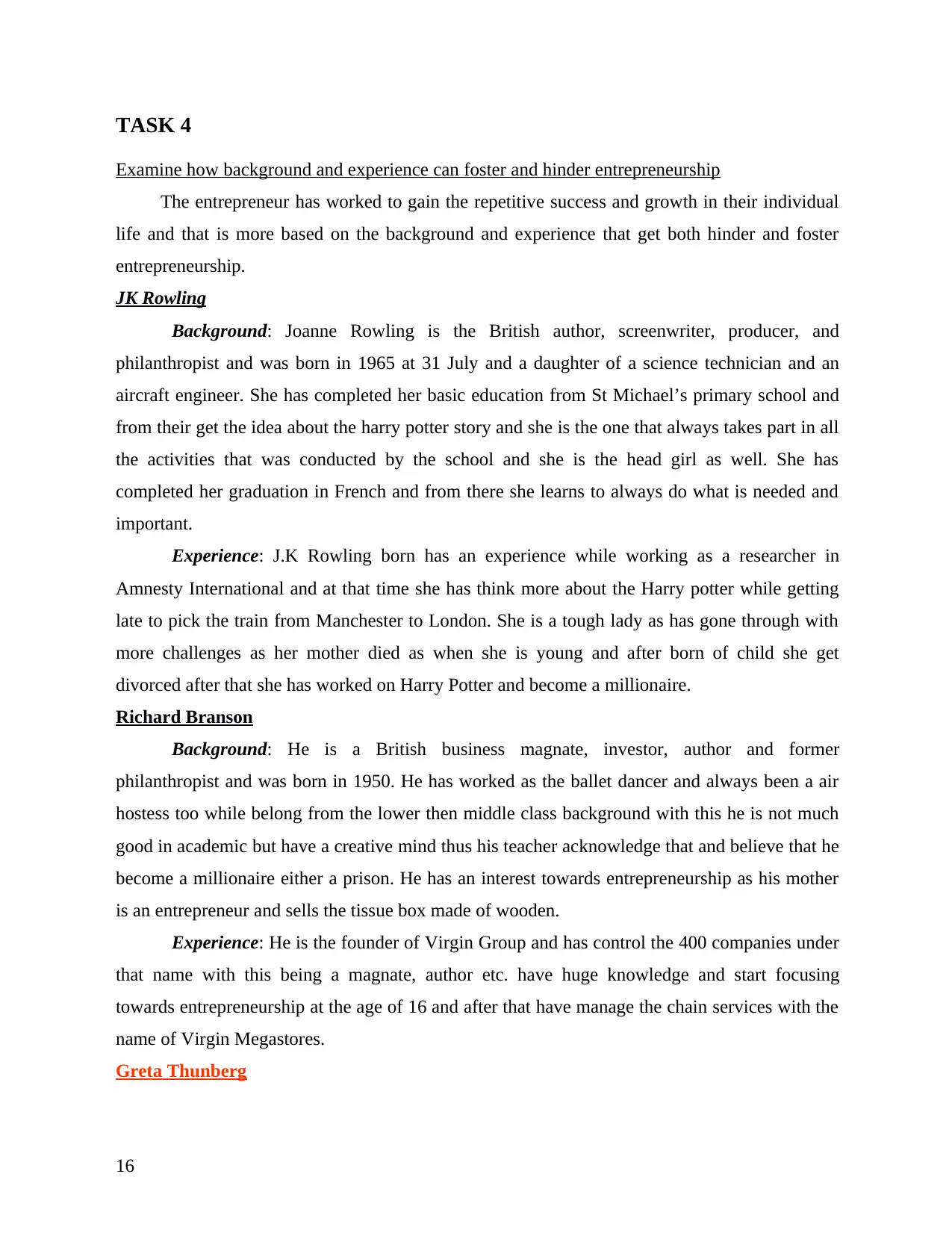
TASK 4
Examine how background and experience can foster and hinder entrepreneurship
The entrepreneur has worked to gain the repetitive success and growth in their individual
life and that is more based on the background and experience that get both hinder and foster
entrepreneurship.
JK Rowling
Background: Joanne Rowling is the British author, screenwriter, producer, and
philanthropist and was born in 1965 at 31 July and a daughter of a science technician and an
aircraft engineer. She has completed her basic education from St Michael’s primary school and
from their get the idea about the harry potter story and she is the one that always takes part in all
the activities that was conducted by the school and she is the head girl as well. She has
completed her graduation in French and from there she learns to always do what is needed and
important.
Experience: J.K Rowling born has an experience while working as a researcher in
Amnesty International and at that time she has think more about the Harry potter while getting
late to pick the train from Manchester to London. She is a tough lady as has gone through with
more challenges as her mother died as when she is young and after born of child she get
divorced after that she has worked on Harry Potter and become a millionaire.
Richard Branson
Background: He is a British business magnate, investor, author and former
philanthropist and was born in 1950. He has worked as the ballet dancer and always been a air
hostess too while belong from the lower then middle class background with this he is not much
good in academic but have a creative mind thus his teacher acknowledge that and believe that he
become a millionaire either a prison. He has an interest towards entrepreneurship as his mother
is an entrepreneur and sells the tissue box made of wooden.
Experience: He is the founder of Virgin Group and has control the 400 companies under
that name with this being a magnate, author etc. have huge knowledge and start focusing
towards entrepreneurship at the age of 16 and after that have manage the chain services with the
name of Virgin Megastores.
Greta Thunberg
16
Examine how background and experience can foster and hinder entrepreneurship
The entrepreneur has worked to gain the repetitive success and growth in their individual
life and that is more based on the background and experience that get both hinder and foster
entrepreneurship.
JK Rowling
Background: Joanne Rowling is the British author, screenwriter, producer, and
philanthropist and was born in 1965 at 31 July and a daughter of a science technician and an
aircraft engineer. She has completed her basic education from St Michael’s primary school and
from their get the idea about the harry potter story and she is the one that always takes part in all
the activities that was conducted by the school and she is the head girl as well. She has
completed her graduation in French and from there she learns to always do what is needed and
important.
Experience: J.K Rowling born has an experience while working as a researcher in
Amnesty International and at that time she has think more about the Harry potter while getting
late to pick the train from Manchester to London. She is a tough lady as has gone through with
more challenges as her mother died as when she is young and after born of child she get
divorced after that she has worked on Harry Potter and become a millionaire.
Richard Branson
Background: He is a British business magnate, investor, author and former
philanthropist and was born in 1950. He has worked as the ballet dancer and always been a air
hostess too while belong from the lower then middle class background with this he is not much
good in academic but have a creative mind thus his teacher acknowledge that and believe that he
become a millionaire either a prison. He has an interest towards entrepreneurship as his mother
is an entrepreneur and sells the tissue box made of wooden.
Experience: He is the founder of Virgin Group and has control the 400 companies under
that name with this being a magnate, author etc. have huge knowledge and start focusing
towards entrepreneurship at the age of 16 and after that have manage the chain services with the
name of Virgin Megastores.
Greta Thunberg
16
Secure Best Marks with AI Grader
Need help grading? Try our AI Grader for instant feedback on your assignments.
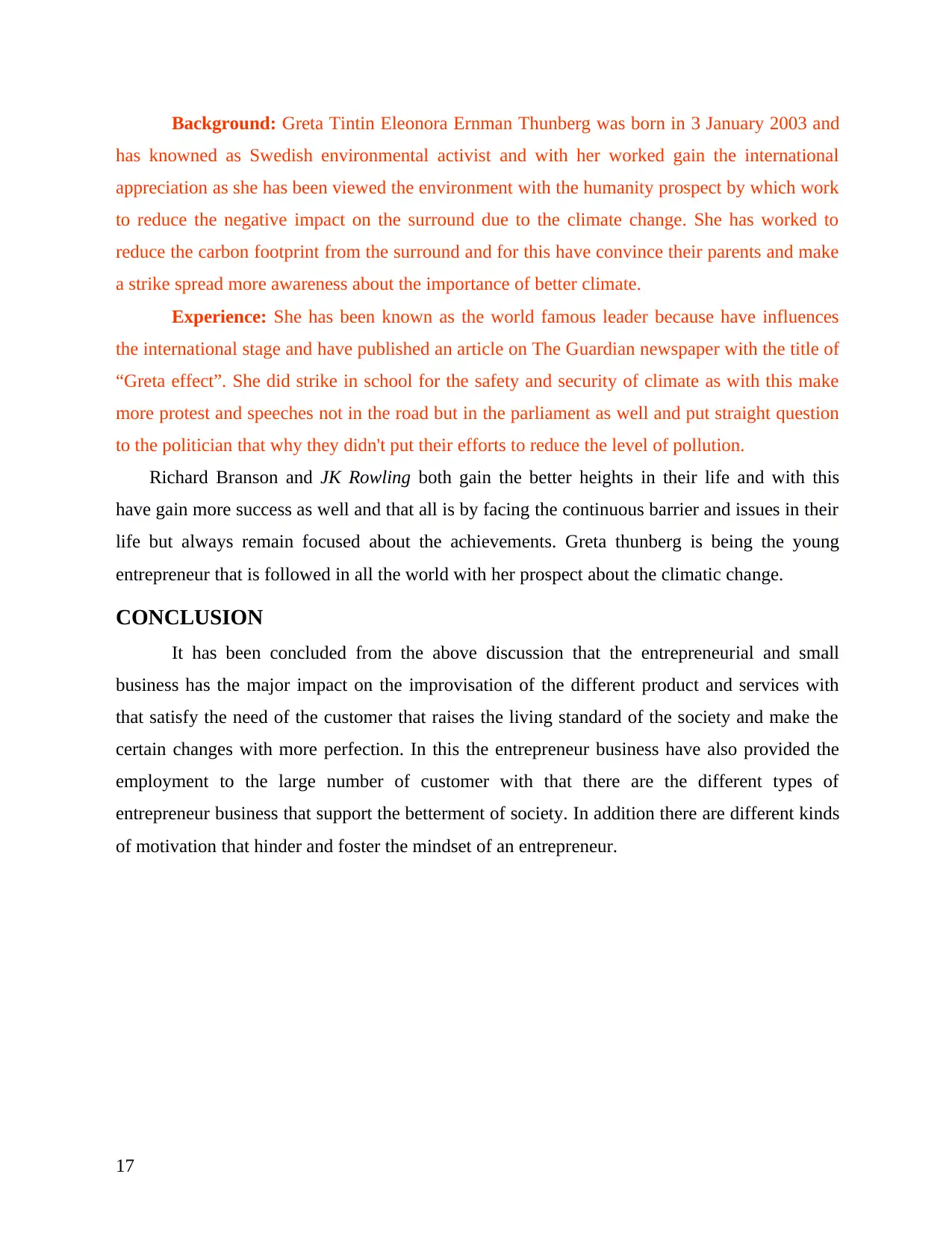
Background: Greta Tintin Eleonora Ernman Thunberg was born in 3 January 2003 and
has knowned as Swedish environmental activist and with her worked gain the international
appreciation as she has been viewed the environment with the humanity prospect by which work
to reduce the negative impact on the surround due to the climate change. She has worked to
reduce the carbon footprint from the surround and for this have convince their parents and make
a strike spread more awareness about the importance of better climate.
Experience: She has been known as the world famous leader because have influences
the international stage and have published an article on The Guardian newspaper with the title of
“Greta effect”. She did strike in school for the safety and security of climate as with this make
more protest and speeches not in the road but in the parliament as well and put straight question
to the politician that why they didn't put their efforts to reduce the level of pollution.
Richard Branson and JK Rowling both gain the better heights in their life and with this
have gain more success as well and that all is by facing the continuous barrier and issues in their
life but always remain focused about the achievements. Greta thunberg is being the young
entrepreneur that is followed in all the world with her prospect about the climatic change.
CONCLUSION
It has been concluded from the above discussion that the entrepreneurial and small
business has the major impact on the improvisation of the different product and services with
that satisfy the need of the customer that raises the living standard of the society and make the
certain changes with more perfection. In this the entrepreneur business have also provided the
employment to the large number of customer with that there are the different types of
entrepreneur business that support the betterment of society. In addition there are different kinds
of motivation that hinder and foster the mindset of an entrepreneur.
17
has knowned as Swedish environmental activist and with her worked gain the international
appreciation as she has been viewed the environment with the humanity prospect by which work
to reduce the negative impact on the surround due to the climate change. She has worked to
reduce the carbon footprint from the surround and for this have convince their parents and make
a strike spread more awareness about the importance of better climate.
Experience: She has been known as the world famous leader because have influences
the international stage and have published an article on The Guardian newspaper with the title of
“Greta effect”. She did strike in school for the safety and security of climate as with this make
more protest and speeches not in the road but in the parliament as well and put straight question
to the politician that why they didn't put their efforts to reduce the level of pollution.
Richard Branson and JK Rowling both gain the better heights in their life and with this
have gain more success as well and that all is by facing the continuous barrier and issues in their
life but always remain focused about the achievements. Greta thunberg is being the young
entrepreneur that is followed in all the world with her prospect about the climatic change.
CONCLUSION
It has been concluded from the above discussion that the entrepreneurial and small
business has the major impact on the improvisation of the different product and services with
that satisfy the need of the customer that raises the living standard of the society and make the
certain changes with more perfection. In this the entrepreneur business have also provided the
employment to the large number of customer with that there are the different types of
entrepreneur business that support the betterment of society. In addition there are different kinds
of motivation that hinder and foster the mindset of an entrepreneur.
17
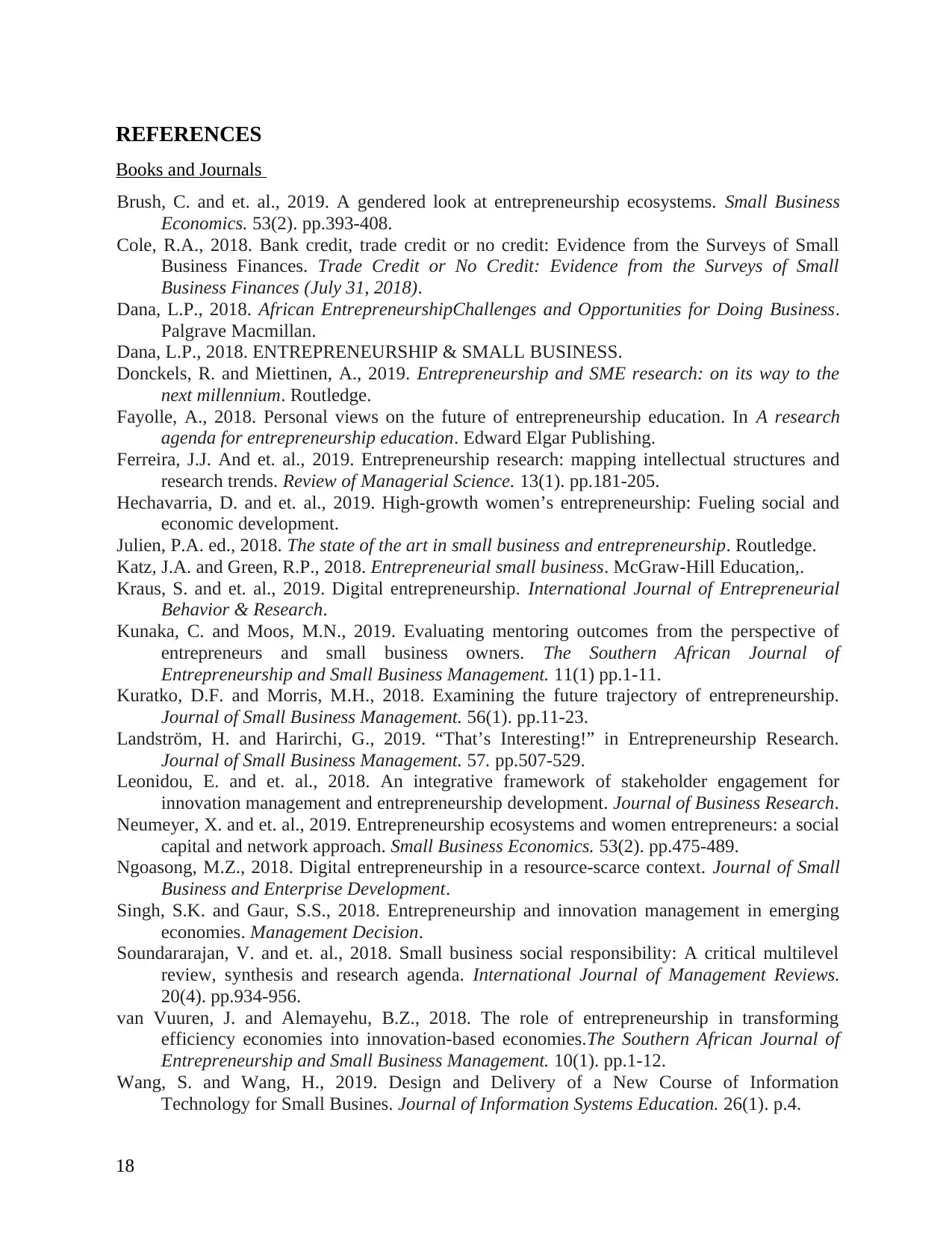
REFERENCES
Books and Journals
Brush, C. and et. al., 2019. A gendered look at entrepreneurship ecosystems. Small Business
Economics. 53(2). pp.393-408.
Cole, R.A., 2018. Bank credit, trade credit or no credit: Evidence from the Surveys of Small
Business Finances. Trade Credit or No Credit: Evidence from the Surveys of Small
Business Finances (July 31, 2018).
Dana, L.P., 2018. African EntrepreneurshipChallenges and Opportunities for Doing Business.
Palgrave Macmillan.
Dana, L.P., 2018. ENTREPRENEURSHIP & SMALL BUSINESS.
Donckels, R. and Miettinen, A., 2019. Entrepreneurship and SME research: on its way to the
next millennium. Routledge.
Fayolle, A., 2018. Personal views on the future of entrepreneurship education. In A research
agenda for entrepreneurship education. Edward Elgar Publishing.
Ferreira, J.J. And et. al., 2019. Entrepreneurship research: mapping intellectual structures and
research trends. Review of Managerial Science. 13(1). pp.181-205.
Hechavarria, D. and et. al., 2019. High‐growth women’s entrepreneurship: Fueling social and
economic development.
Julien, P.A. ed., 2018. The state of the art in small business and entrepreneurship. Routledge.
Katz, J.A. and Green, R.P., 2018. Entrepreneurial small business. McGraw-Hill Education,.
Kraus, S. and et. al., 2019. Digital entrepreneurship. International Journal of Entrepreneurial
Behavior & Research.
Kunaka, C. and Moos, M.N., 2019. Evaluating mentoring outcomes from the perspective of
entrepreneurs and small business owners. The Southern African Journal of
Entrepreneurship and Small Business Management. 11(1) pp.1-11.
Kuratko, D.F. and Morris, M.H., 2018. Examining the future trajectory of entrepreneurship.
Journal of Small Business Management. 56(1). pp.11-23.
Landström, H. and Harirchi, G., 2019. “That’s Interesting!” in Entrepreneurship Research.
Journal of Small Business Management. 57. pp.507-529.
Leonidou, E. and et. al., 2018. An integrative framework of stakeholder engagement for
innovation management and entrepreneurship development. Journal of Business Research.
Neumeyer, X. and et. al., 2019. Entrepreneurship ecosystems and women entrepreneurs: a social
capital and network approach. Small Business Economics. 53(2). pp.475-489.
Ngoasong, M.Z., 2018. Digital entrepreneurship in a resource-scarce context. Journal of Small
Business and Enterprise Development.
Singh, S.K. and Gaur, S.S., 2018. Entrepreneurship and innovation management in emerging
economies. Management Decision.
Soundararajan, V. and et. al., 2018. Small business social responsibility: A critical multilevel
review, synthesis and research agenda. International Journal of Management Reviews.
20(4). pp.934-956.
van Vuuren, J. and Alemayehu, B.Z., 2018. The role of entrepreneurship in transforming
efficiency economies into innovation-based economies.The Southern African Journal of
Entrepreneurship and Small Business Management. 10(1). pp.1-12.
Wang, S. and Wang, H., 2019. Design and Delivery of a New Course of Information
Technology for Small Busines. Journal of Information Systems Education. 26(1). p.4.
18
Books and Journals
Brush, C. and et. al., 2019. A gendered look at entrepreneurship ecosystems. Small Business
Economics. 53(2). pp.393-408.
Cole, R.A., 2018. Bank credit, trade credit or no credit: Evidence from the Surveys of Small
Business Finances. Trade Credit or No Credit: Evidence from the Surveys of Small
Business Finances (July 31, 2018).
Dana, L.P., 2018. African EntrepreneurshipChallenges and Opportunities for Doing Business.
Palgrave Macmillan.
Dana, L.P., 2018. ENTREPRENEURSHIP & SMALL BUSINESS.
Donckels, R. and Miettinen, A., 2019. Entrepreneurship and SME research: on its way to the
next millennium. Routledge.
Fayolle, A., 2018. Personal views on the future of entrepreneurship education. In A research
agenda for entrepreneurship education. Edward Elgar Publishing.
Ferreira, J.J. And et. al., 2019. Entrepreneurship research: mapping intellectual structures and
research trends. Review of Managerial Science. 13(1). pp.181-205.
Hechavarria, D. and et. al., 2019. High‐growth women’s entrepreneurship: Fueling social and
economic development.
Julien, P.A. ed., 2018. The state of the art in small business and entrepreneurship. Routledge.
Katz, J.A. and Green, R.P., 2018. Entrepreneurial small business. McGraw-Hill Education,.
Kraus, S. and et. al., 2019. Digital entrepreneurship. International Journal of Entrepreneurial
Behavior & Research.
Kunaka, C. and Moos, M.N., 2019. Evaluating mentoring outcomes from the perspective of
entrepreneurs and small business owners. The Southern African Journal of
Entrepreneurship and Small Business Management. 11(1) pp.1-11.
Kuratko, D.F. and Morris, M.H., 2018. Examining the future trajectory of entrepreneurship.
Journal of Small Business Management. 56(1). pp.11-23.
Landström, H. and Harirchi, G., 2019. “That’s Interesting!” in Entrepreneurship Research.
Journal of Small Business Management. 57. pp.507-529.
Leonidou, E. and et. al., 2018. An integrative framework of stakeholder engagement for
innovation management and entrepreneurship development. Journal of Business Research.
Neumeyer, X. and et. al., 2019. Entrepreneurship ecosystems and women entrepreneurs: a social
capital and network approach. Small Business Economics. 53(2). pp.475-489.
Ngoasong, M.Z., 2018. Digital entrepreneurship in a resource-scarce context. Journal of Small
Business and Enterprise Development.
Singh, S.K. and Gaur, S.S., 2018. Entrepreneurship and innovation management in emerging
economies. Management Decision.
Soundararajan, V. and et. al., 2018. Small business social responsibility: A critical multilevel
review, synthesis and research agenda. International Journal of Management Reviews.
20(4). pp.934-956.
van Vuuren, J. and Alemayehu, B.Z., 2018. The role of entrepreneurship in transforming
efficiency economies into innovation-based economies.The Southern African Journal of
Entrepreneurship and Small Business Management. 10(1). pp.1-12.
Wang, S. and Wang, H., 2019. Design and Delivery of a New Course of Information
Technology for Small Busines. Journal of Information Systems Education. 26(1). p.4.
18

Wynn, M. and Jones, P., 2019. Context and entrepreneurship in knowledge transfer partnerships
with small business enterprises. The International Journal of Entrepreneurship and
Innovation. 20(1). pp.8-20.
19
with small business enterprises. The International Journal of Entrepreneurship and
Innovation. 20(1). pp.8-20.
19
1 out of 19
Related Documents
Your All-in-One AI-Powered Toolkit for Academic Success.
+13062052269
info@desklib.com
Available 24*7 on WhatsApp / Email
![[object Object]](/_next/static/media/star-bottom.7253800d.svg)
Unlock your academic potential
© 2024 | Zucol Services PVT LTD | All rights reserved.




